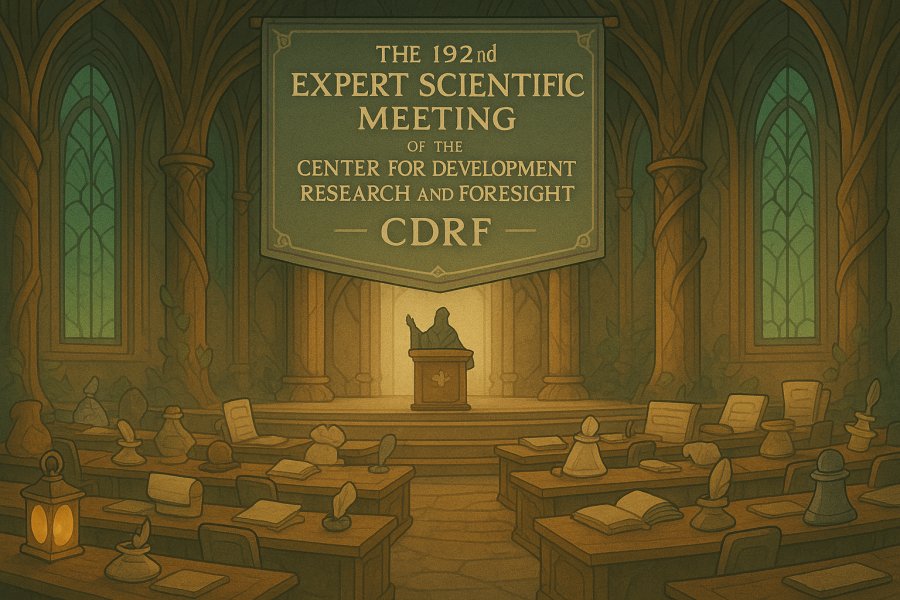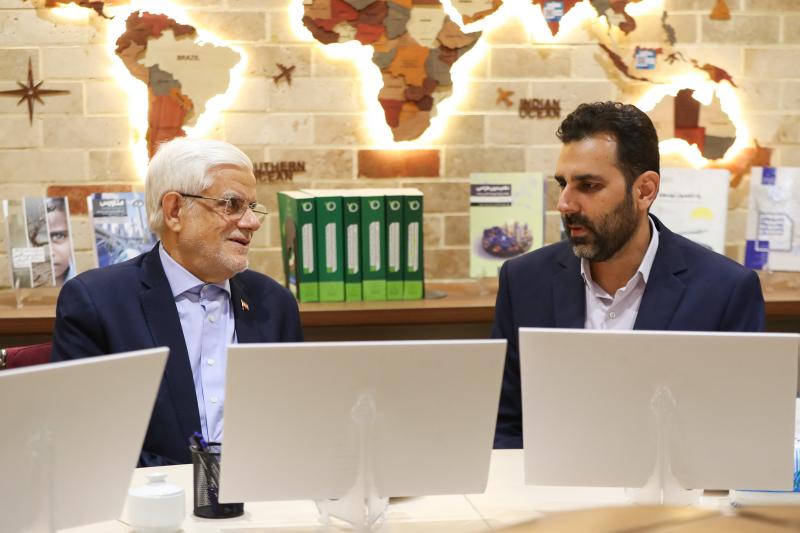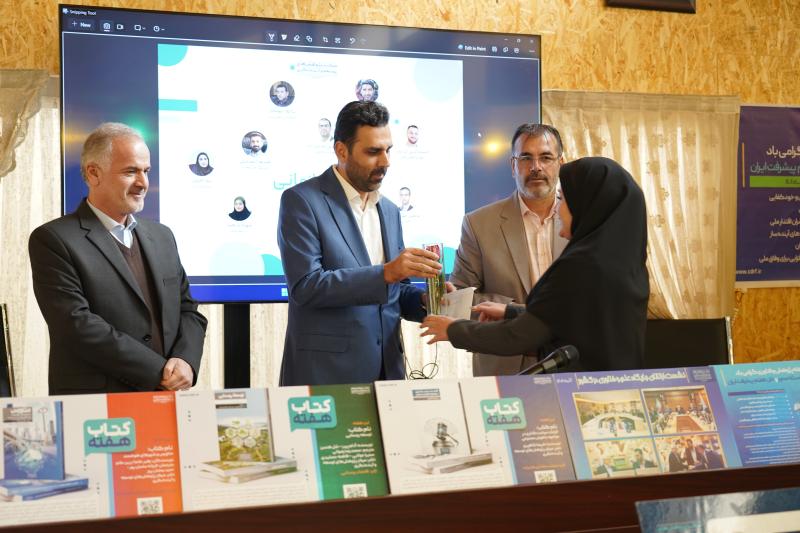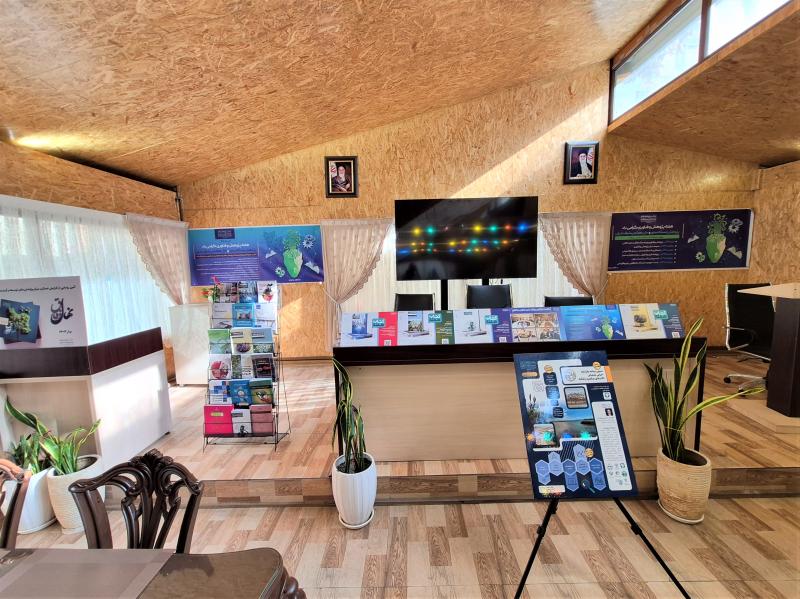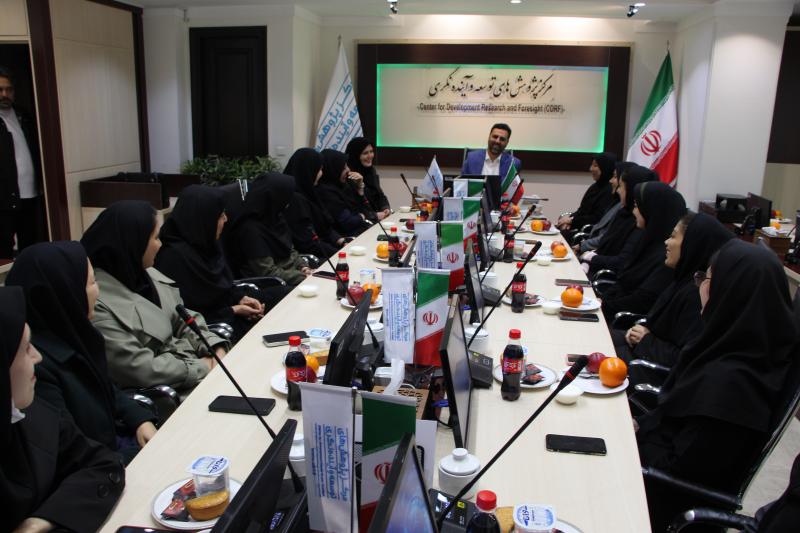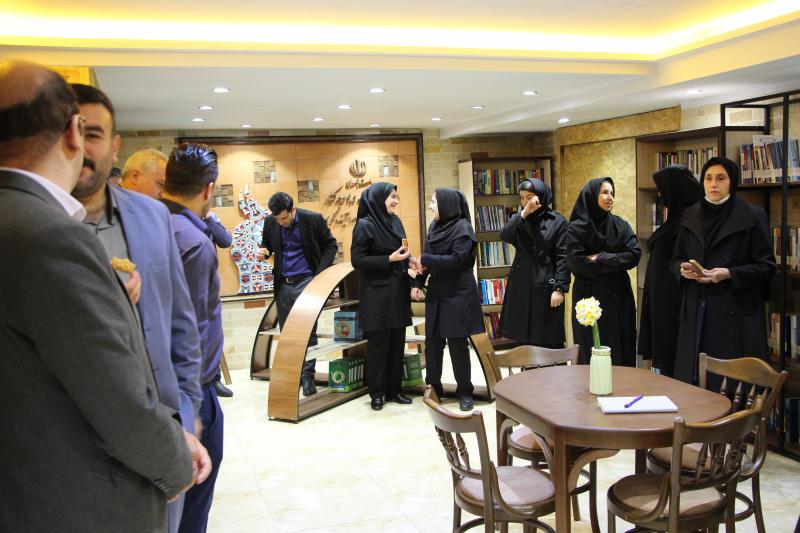
-
بررسی آییننامهها و دستورالعملهای برنامه هفتم پیشرفت
-
بررسی عوامل موثر بر افزایش تصادفات و تلفات جادهای و سوانح رانندگی و دادهکاوی تلفات انسانی
-
سازماندهی و بازآرایی فضایی آموزش عالی کشور
-
به روز رسانی سند ملی آمایش سرزمین
-
انجام مطالعات مناطق آزاد به عنوان نواحی پیشران اقتصادی کشور
-
اصلاح ساختار بودجه و پیاده سازی نظام یکپارچه مدیریت اطلاعات مالی دولت (IFMIS)
کلید واژه : ISC
تعداد اخبار : 73
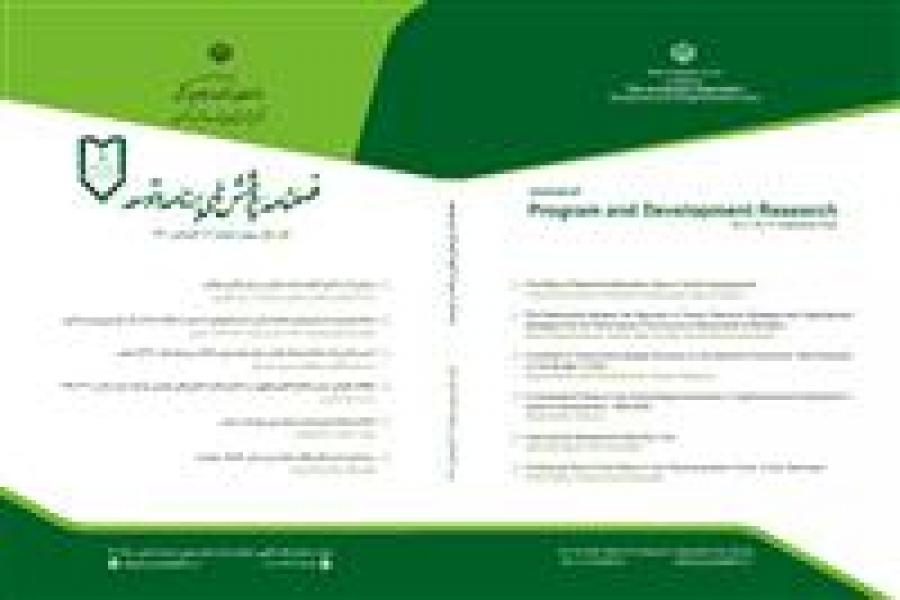
موفقیتی دیگر برای فصلنامه پژوهش های برنامه و توسعه در دهمین ایستگاه انتشار
همزمان با انتشار دهمین شماره از فصلنامۀ علمی پژوهش‌های برنامه و توسعه مرکز پژوهش‌های توسعه و آینده‌نگری، این مجله در پایگاه استنادی علوم جهان اسلام (ISC) نمایه و برای تمام مقالات علاوه بر کد DOI، کد DOR (شناسه دیجیتال اشیا) اخذ شد. 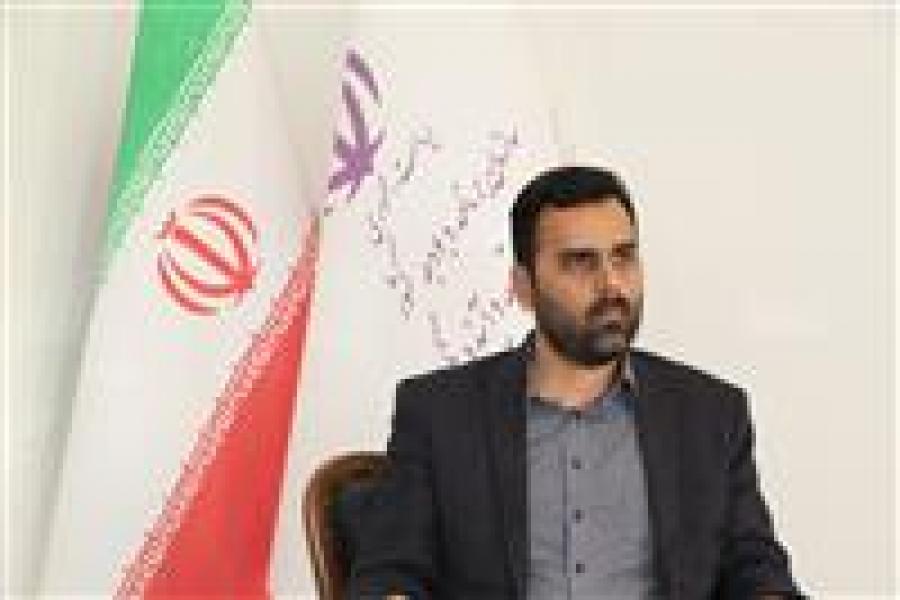
ریل گذاری صحیح پژوهش و امتداد مطالعات تا مرحله اجرا
دکتر سید مهدی پاکذات گفت: ریل گذاری صحیح پژوهش و امتداد پژوهش تا مرحله سیاست گذاری و اجرا با استفاده از نظرات افراد صاحب تجربه و مجاهدت جوانان تحول خواه می تواند ضرب آهنگ تحولات را به سمت رفع کاستی های موجود رهنمون سازد. 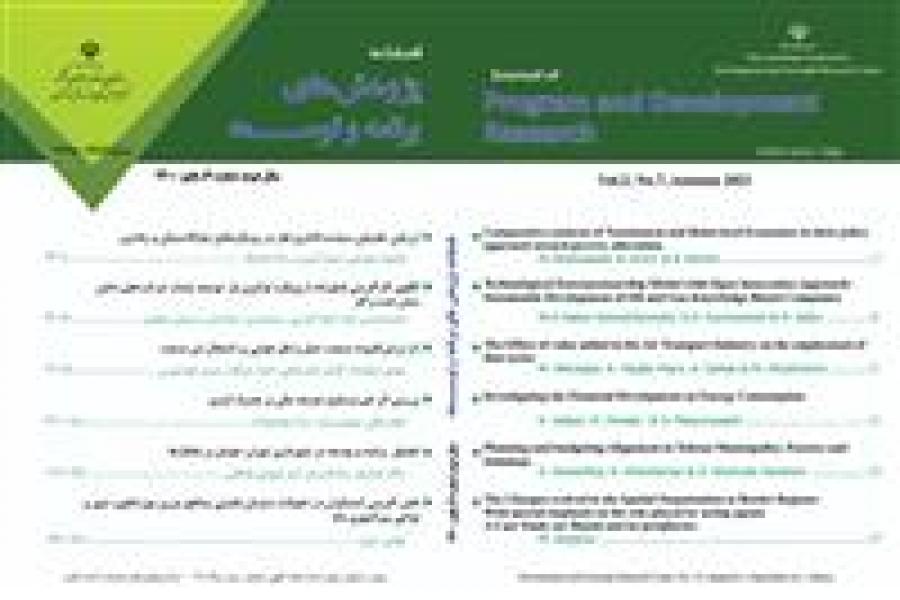
هفتمین شماره از فصلنامه علمی پژوهش‌های برنامه و توسعه
به گزارش روابط عمومی مرکز، هفتمین شماره از فصلنامه علمی "پژوهشهای برنامه توسعه" مرکز پژوهش های توسعه و آینده نگری منتشر شد. 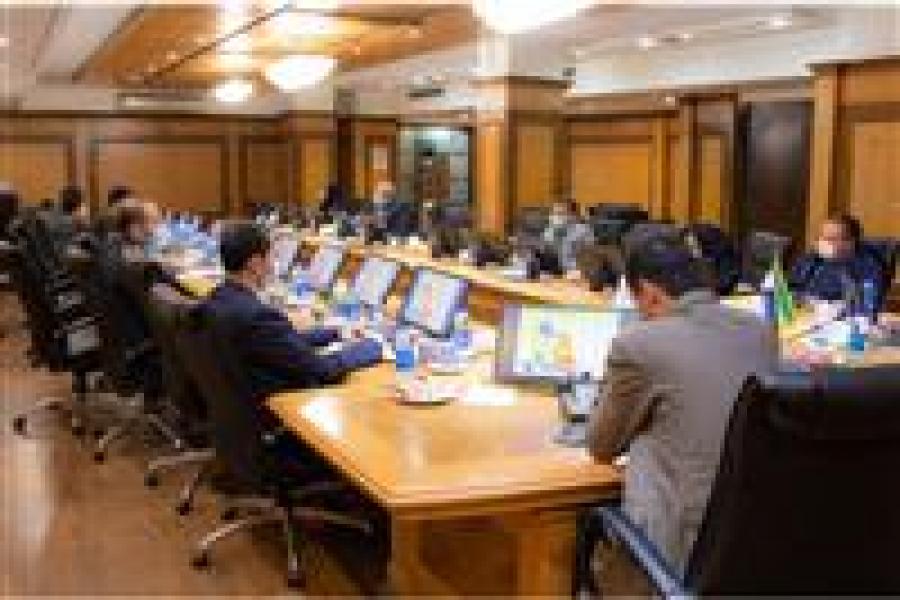
لزوم رعایت ملاحظات آمایش در اجرای طرح جهش تولید و تأمین مسکن
به گزارش روابط عمومی مرکز، گروه پژوهشی آمایش سرزمین مرکز پژوهش های توسعه و آینده نگری به عنوان میزبان نشست «ملاحظات آمایش در اجرای طرح جهش تولید و تأمین مسکن» در ابتدای این نشست تخصصی، ضمن بیان ارائه ای از محتوای سند ملی آمایش سرزمین در ارتباط با طرح تولید و تأمین مسکن، اولویت های سه گانه ای را درخصوص استقرار جمعیت در پهنه سرزمین با توجه به ملاحظات آمایشی مطرح نمود 
سرپرست دفتر نشر منابع علمی منصوب شد
جناب آقای محمدرضا رضایی به عنوان سرپرست دفتر نشر منابع علمی مرکز پژوهش های توسعه و آینده نگری منصوب شد 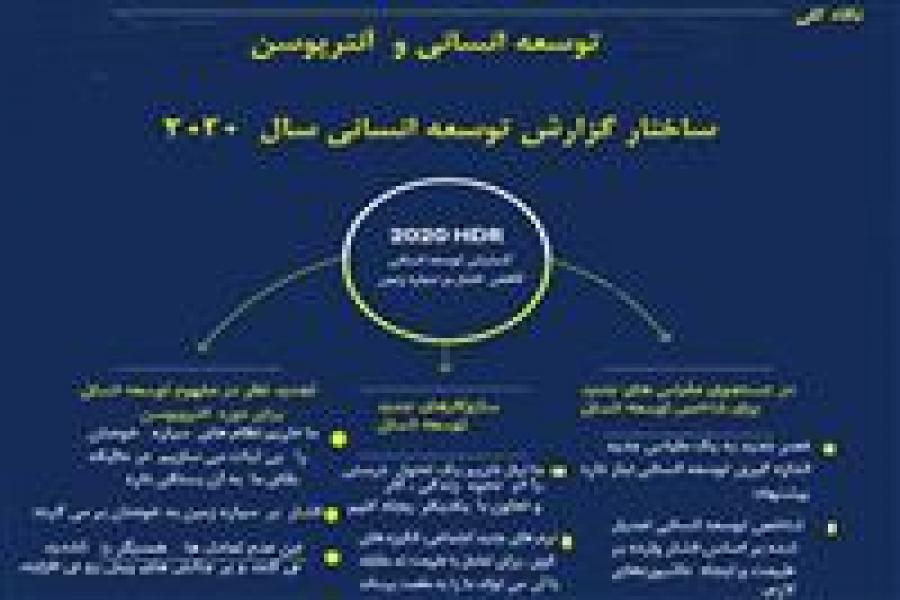
نکات مهم و برجسته در گزارش توسعه انسانی ملل متحد، ۲۰۲۰ تهیه و تنطیم: دکتر یداله ابراهیمی فر
در دهه های گذشته مقایسه کشورها از نظر توسعه اقتصادی و انسانی براساس میزان تولید ناخالص داخلی یا سرانه تولید صورت می گرفت. با تلاش های علمی دو چهره سرشناس جهانی (محبوب الحق و آمارتیا سن) در زمینه مسائل توسعه انسانی، شاخص توسعه انسانی به جهان معرفی گردید. شاخص توسعه انسانی یک شاخص ترکیبی است که با سه متغیر، امید به زندگی، تحصیل سواد و تولید ناخالص سرانه که مرتبط با کیفیت زندگی انسان هستند، ساخته شده است. 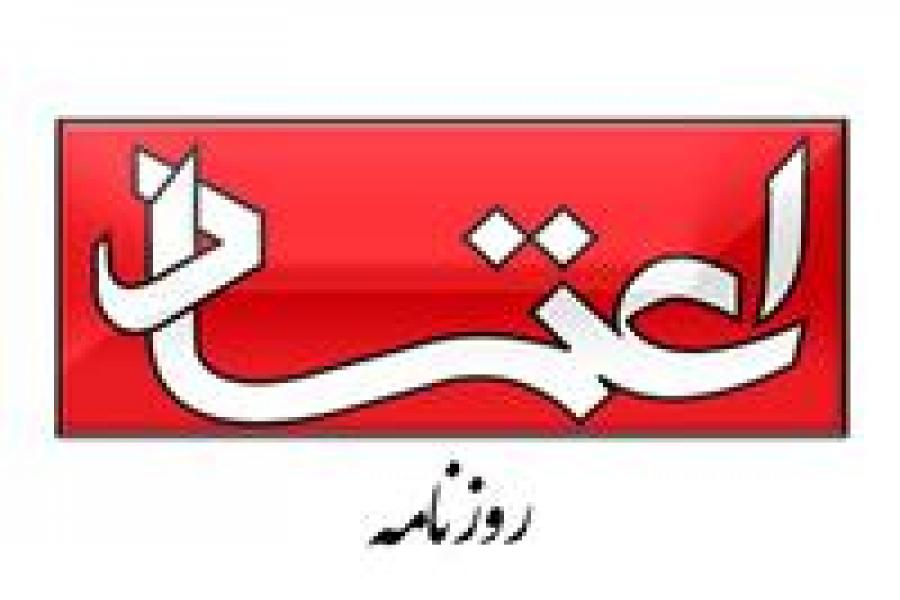
انفعال دانشگاه‌ها در تولید دانش‌بنیان و اشتغال‌آفرین
به گزارش روزنامه اعتماد، علم و دانش، ویژگی بارز عصر حاضر است که آن را از سایر اعصار متمایز می‌کند. هرگاه در علم بشری تحولی روی داده و در اندیشه علمی، رشد چشمگیری حاصل شده، کیفیت زندگی متحول شده و جهان یک گام به پیش نهاده است. 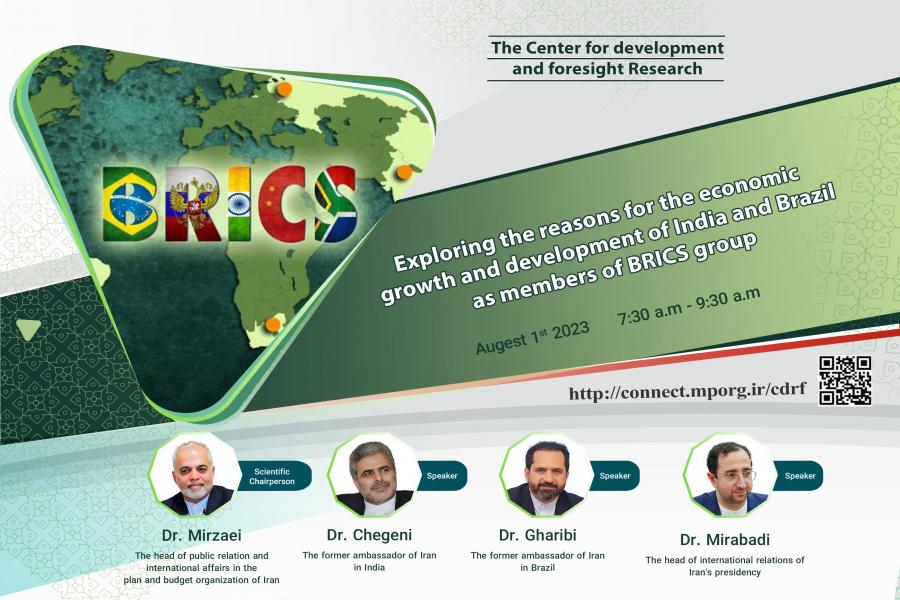
The private sector is the driving force of the BRICS countries’ economic development
The specialized conference of “Exploring the reasons for the success of the development plans of the BRICS countries; with a focus on Brazil and India” was held. It was stated that the private sector is considered as the driving force of economic development in Brazil and India. Also, it was mentioned that utilizing the economic development experience of Brazil and India would be a pivotal factor for the development of Iran’s economy.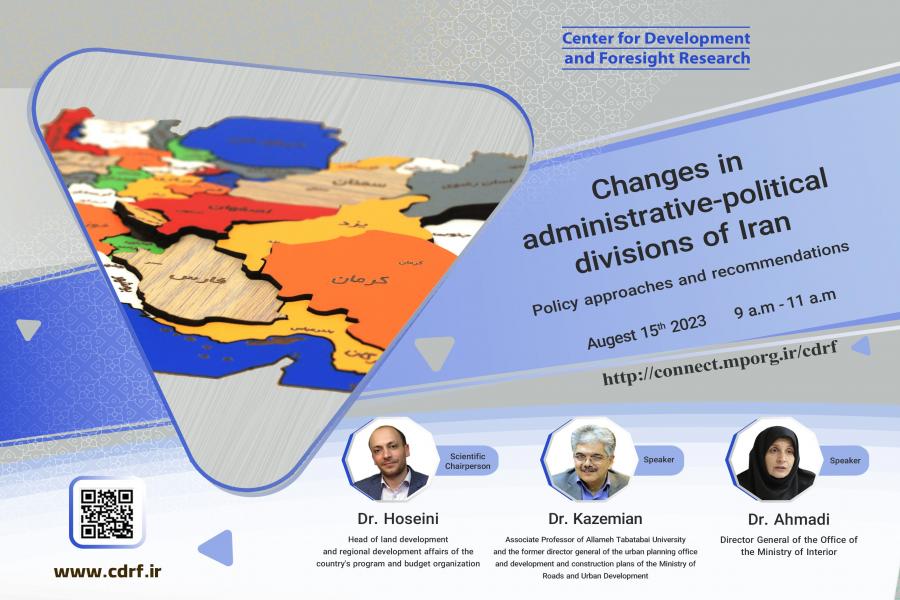
National Land Use Plan: The Key to Balanced Development and Budget Resource Allocation
The scientific-specialized conforence of "Transformations in the Administrative-Political Divisions of Iran: Approaches and Policy Recommendations" was held. 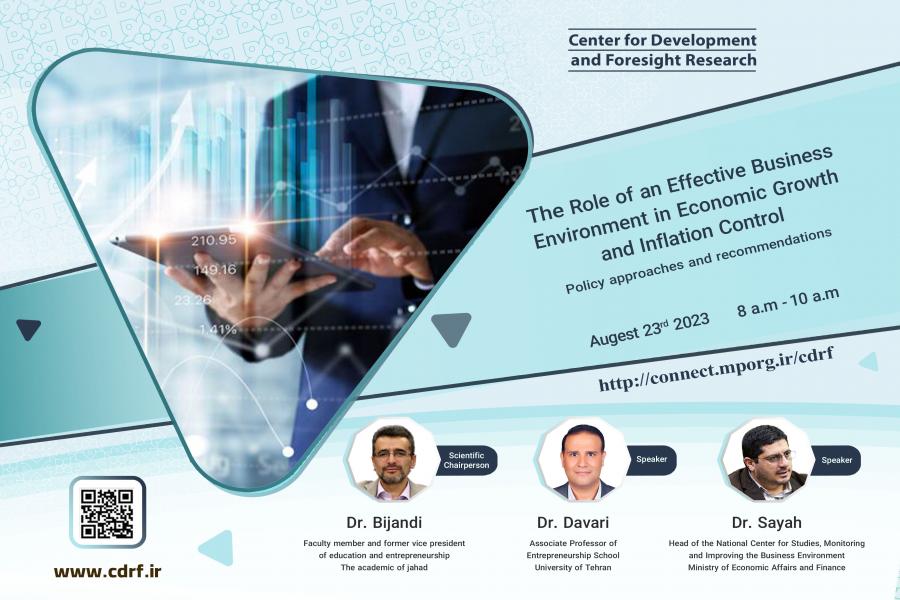
The Role of an Effective Business Environment in Economic Growth and Inflation Control: Approaches and Policy Recommendations
The specialized conference titled “The Role of an Effective Business Environment in Economic Growth and Inflation Control: Approaches and Policy Recommendations” was recently held. The conference was attended by several notable figures, including Dr. Mohammad Sadegh Bijandi, a former member of the academic board and deputy of education and entrepreneurship of the Academic Center for Education, Culture, and Research, who served as the scientific director. Other attendees included Dr. Ali Davari, an associate professor of entrepreneurship at the University of Tehran, and Dr. Amir Sayyah, the head of the National Center for Business Environment Studies, Monitoring, and Improvement of the Ministry of Economic Affairs and Finance, who both served as scientific speakers. The conference aimed to discuss approaches and policy recommendations for creating an effective business environment to promote economic growth and control inflation..jpg)
Mass housing is the public demand from the government.
The scientific-specialized meeting entitled "Strategies for addressing the Housing Supply Crisis" was held with the presence of Mr. Rouhollah Akbari, Special Assistant to the Minister and Secretary of the Committee of Housing of the Ministry of Roads and Urban Development, as the scientific director, Dr. Mohammad Hossein Sharifzadegan, Professor at Shahid Beheshti University and former Minister of Welfare and Social Security, and Dr. Abolfazl Norouzi, Advisor to the Minister and Director General of the Housing Economy Office of the Ministry of Roads and Urban Development, as speakers.
Iran’s Golden Opportunity: Exploring New Commercial Markets in Africa
In the conference of “The Role of International Relations in Controlling Inflation and Production Growth”, it is stated that the main economic goals at the Ministry of Foreign Affairs are fostering currency inflow and boosting employment growth. The embassies have a special mission to support and market the products of 640 domestic knowledge-based companies. Special attention is given to Iran's business opportunities with neighboring countries, Latin America, Southeast Asia, and especially Africa as a priority of the Ministry of Foreign Affairs in the thirteenth government. There is a high demand for Iran's medical and pharmaceutical products in Latin America..jpg)
Agricultural Sector Achieves Significant Growth, but Challenges Remain
The scientific conference titled "The Role of Balancing Production and Consumption of Agricultural Products in Controlling Inflation" underscored the significance of food security and self-sufficiency. It emphasized the urgency to augment investment in the agricultural sector and the imperative to establish a comprehensive production chain for agricultural products..jpg)
Public-Private Partnerships in Land Development: Key Figures Discuss Pressing Issues
In the specialized conference titled "The Model of Public-Private Partnership in Land Development", it is stated that Public-Private Partnerships (PPPs) are essential for meeting the world's infrastructure needs, but face challenges such as financing, maintenance, and planning. Governments play a crucial role in PPPs by fostering a collaborative environment, building capacity, and providing transparent policy-making and necessary financial resources. In Iran, PPPs are still in their early stages, and the government needs to address challenges such as lack of interest from executive agencies and absence of a comprehensive approach.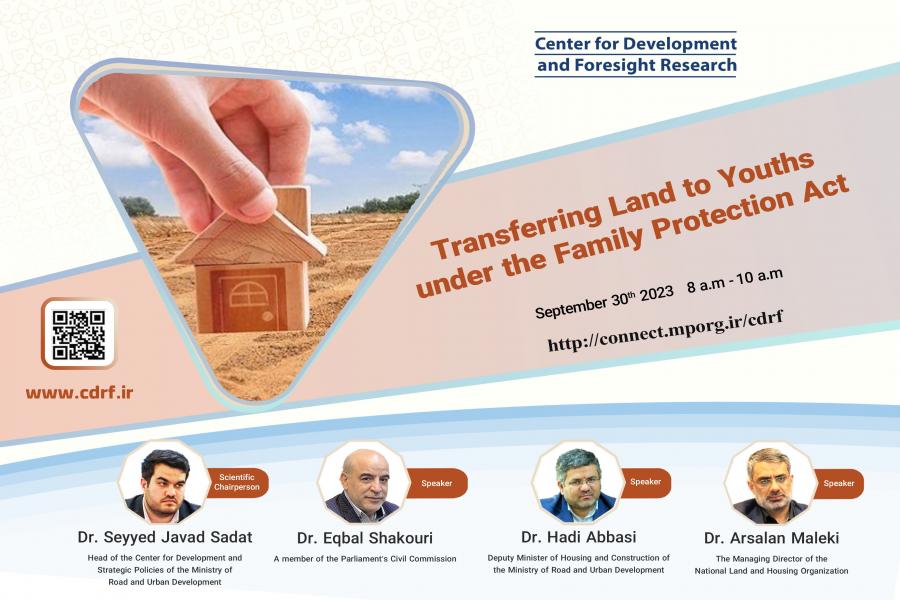
Transferring lands to youths under the Family Protection Act is a positive step in the right direction.
The conference of "Transferring Lands to Youths under the Family Protection Act: Challenges and Policy Recommendations" was held by the participation of notable figures. It is stated that the government is committed to supporting the family and youth population, and the land transfer program is a positive step in the right direction. Also, it is pointed out that it is important to ensure that the program is implemented effectively and efficiently, and that all eligible households are able to benefit from it.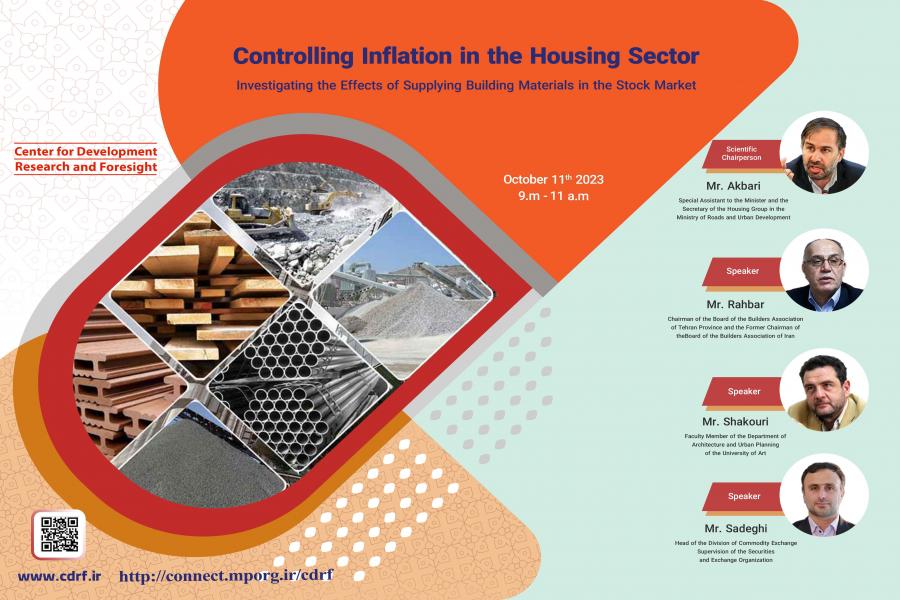
Supplying Building Materials in the Stock Market is a Matter with Controversial Perspectives.
The Center for Development and Foresight Research recently organized a specialized conference focused on addressing inflation in the housing sector, specifically examining the effects of supplying building materials in the stock market. The conference was led by Mr. Rouhollah Akbari, a special assistant to the Minister and the secretary of the housing group in the Ministry of Roads and Urban Development. Various experts from academia and industry presented their perspectives so that a comprehensive outlook can be provided to all interested in this topic..jpg)
CDRF Conference Discusses Planning-oriented Governance for Water, Food, and Farmer's Livelihood Security
The Center for Development Research and Foresight (CDRF) held a conference on planning-oriented governance for water, food, and farmer's livelihood security. The conference speakers discussed the importance of agriculture in land use planning, the three pillars of food security, and global challenges to food security. They also defined land use planning and food sovereignty, and emphasized the importance of sustainable farming practices. The CDRF conference highlighted the critical role of agriculture and food security in land use planning. The speakers discussed the challenges to food security and the need for sustainable farming practices. They also emphasized the importance of empowering producers and consumers with control over the production, distribution, and consumption of food.
China's Technological Leapfrogging and Economic Catch-up
In his book, "China's Technological Leapfrogging & Economic Catch-Up- A Schumpeterian Perspective", Professor Keun Lee examines China's economic growth from a Schumpeterian perspective. He argues that China's success in catching up to the developed economies has been due in part to its ability to leapfrog over older technologies and adopt new technologies more quickly.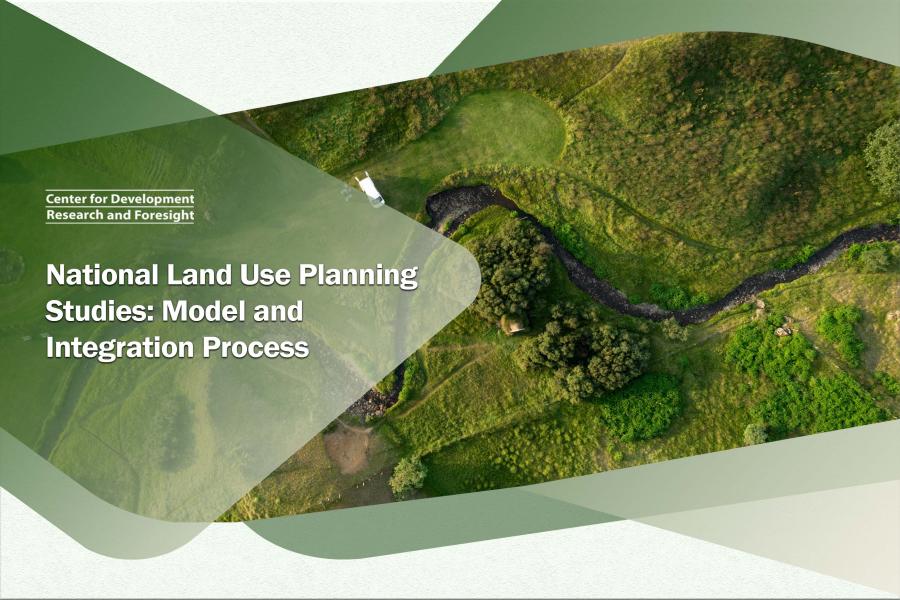
National Spatial Planning Studies: Model and Integration Process
Spatial planning is the process of designing a desirable spatial organization of activities, population, and their impacts on territory. Therefore, its main objective is to consider sectoral and regional balances and balanced land use in formulating scenarios and determining the preferred pattern of population and activity distribution.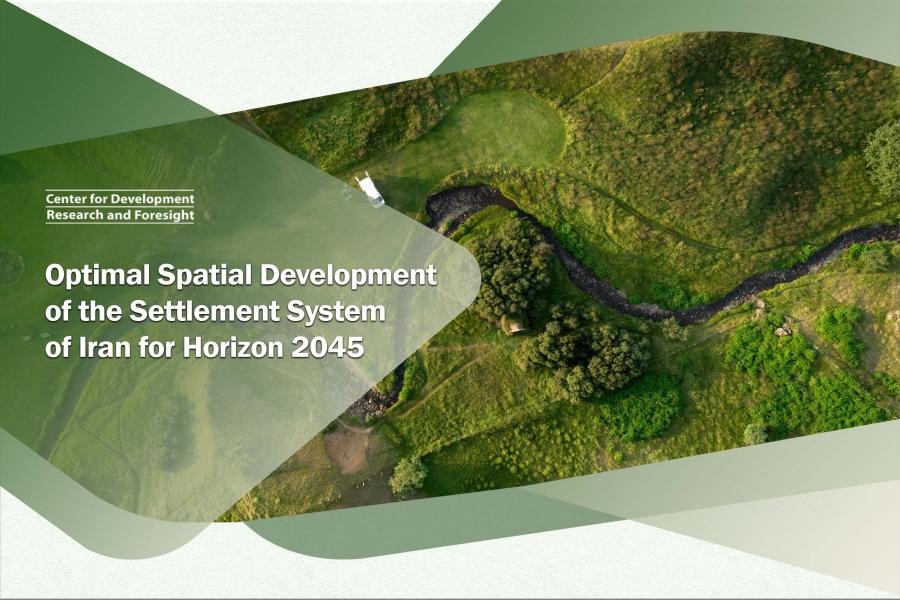
Optimal Spatial Development of the Settlement System of Iran for Horizon 2045
Space is the domain where all economic, political, social, and cultural relations of humans and the platform for all human activities are manifested and transformed. This domain is influenced and shaped by geographical, cultural, economic, and social characteristics and conditions. Throughout history, human civilizations have resulted in the formation of a specific type of space and settlement system organization of different ethnic groups and nations with diverse origins. However, these transformations, which occurred very slowly in the past, have had a very rapid and significant impact on spatial effects in recent centuries.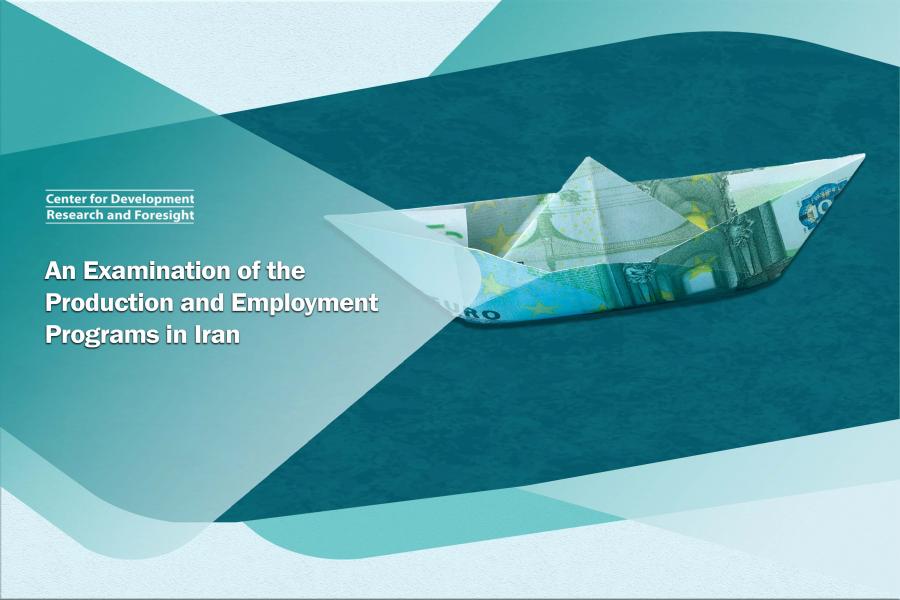
An Examination of the Production and Employment Programs in Iran
Commencing in 2016, the Iranian annual budget legislation has consistently highlighted employment support, production and employment, as articulated in Article 18. A comprehensive examination has been undertaken on the way that Article 18 has been performed within this specified duration. The examination disclosed the existence of certain deficiencies in planning.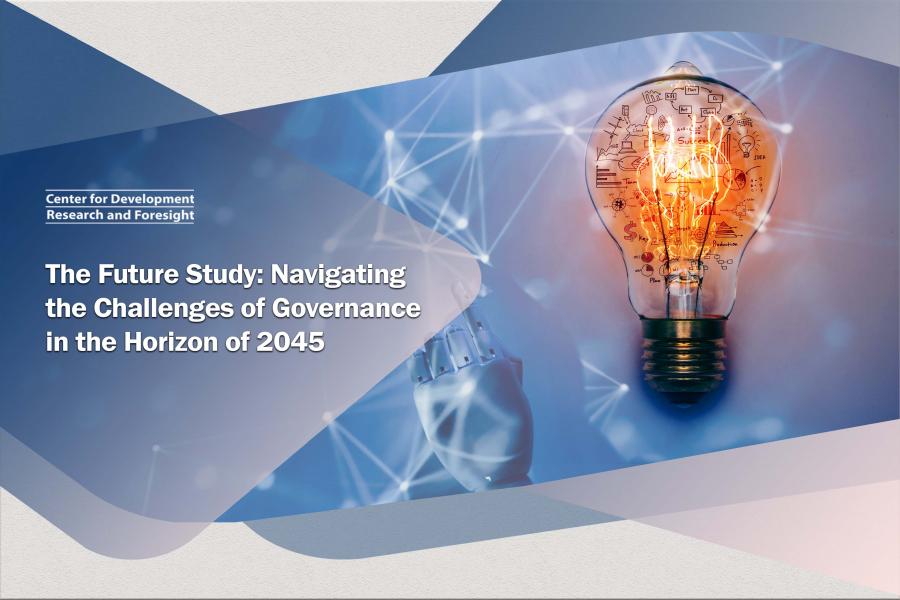
The Future Study: Navigating the Challenges of Governance in the Horizon of 2045
Spatial Planning has been characterized as a means of reclaiming land and asserting sovereignty, essentially establishing it as a category of governance and policy-making. As such, it represents a continuous evolution of governance approaches. The Spatial Planning document draws upon inputs from the political realm and public policies, culminating in a national document that serves as a public policy notification. Given that governance is the primary institution established by a society to overcome existing challenges and achieve desired outcomes, the government's utilization of the national spatial planning document fulfills a distinctly governance-oriented function. This functional affinity necessitates careful consideration of governance processes when selecting tools, including the national spatial planning document, for long-term use.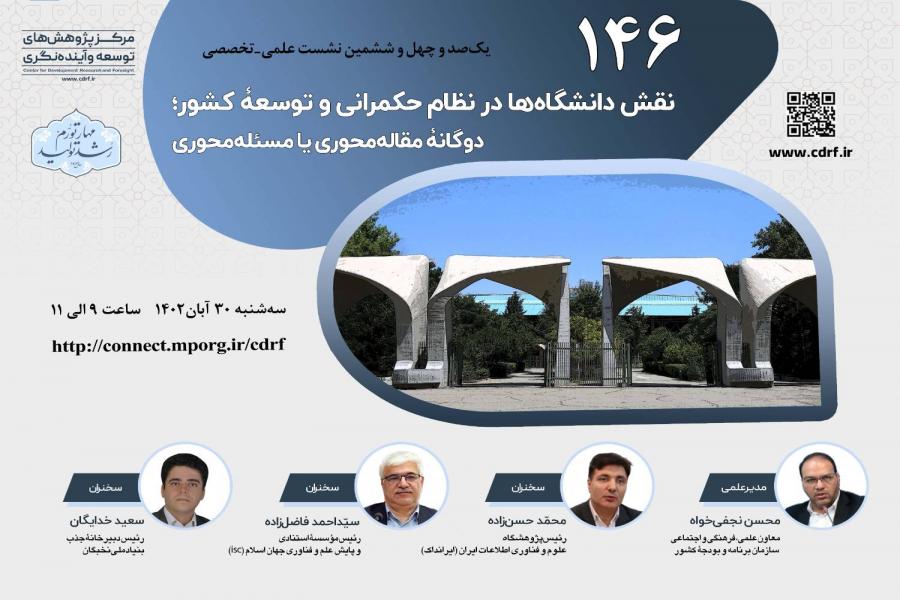
نشست بررسی پدیده مقاله محوری یا مسأله محوری در نظام دانشگاهی کشور برگزار میشود
یک‌صد و چهل و ششمین نشست علمی-تخصصی با عنوان" نقش دانشگاه‌ها در نظام حکمرانی و توسعه کشور؛ دوگانه مقاله محوری یا مسأله محوری" برگزار می‌شود.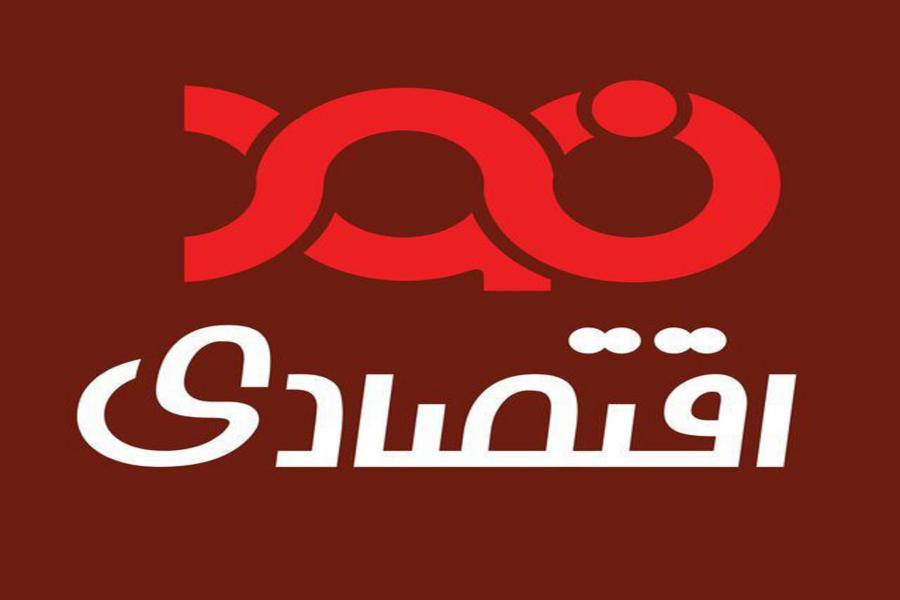
نشست بررسی پدیده مقاله محوری یا مسأله محوری در نظام دانشگاهی کشور برگزار میشود
به گزارش «نود اقتصادی» به نقل از روابط‌عمومی مرکز، یک‌صد و چهل و ششمین نشست علمی-تخصصی با عنوان" نقش دانشگاه‌ها در نظام حکمرانی و توسعه کشور؛ دوگانه مقاله محوری یا مسأله محوری "روز سه‌شنبه 30 آبان‌ماه 1402، از ساعت 9:00 الی 11:00، با حضــور جامعه علمی، پژوهشی، دانشگاهی، اندیشگاهـی، صاحب‌نظران، مدیـران، کارشناسان دستگاه‌های اجــرایی ملّی و استـانی برگزار می‌شود.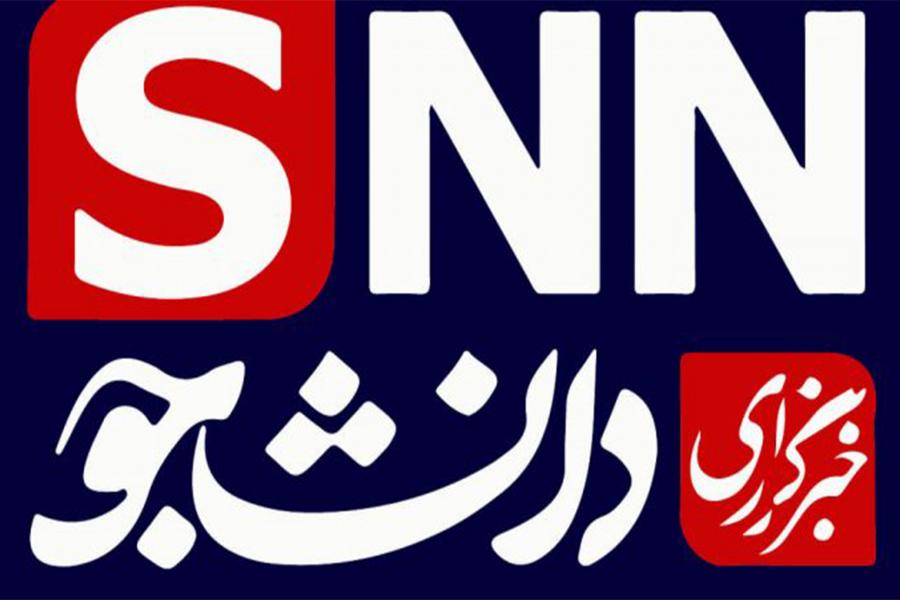
نشست بررسی پدیده مقاله محوری یا مسأله محوری در نظام دانشگاهی برگزار میشود
به گزارش گروه دانشگاه خبرگزاری دانشجو، یک‌صد و چهل و ششمین نشست علمی-تخصصی با عنوان" نقش دانشگاه‌ها در نظام حکمرانی و توسعه کشور؛ دوگانه مقاله محوری یا مسأله محوری "روز سه‌شنبه ۳۰ آبان‌ماه ۱۴۰۲، از ساعت ۹:۰۰ الی ۱۱:۰۰، با حضــور جامعه علمی، پژوهشی، دانشگاهی، اندیشگاهـی، صاحب‌نظران، مدیـران، کارشناسان دستگاه‌های اجــرایی ملّی و استـانی برگزار می‌شود.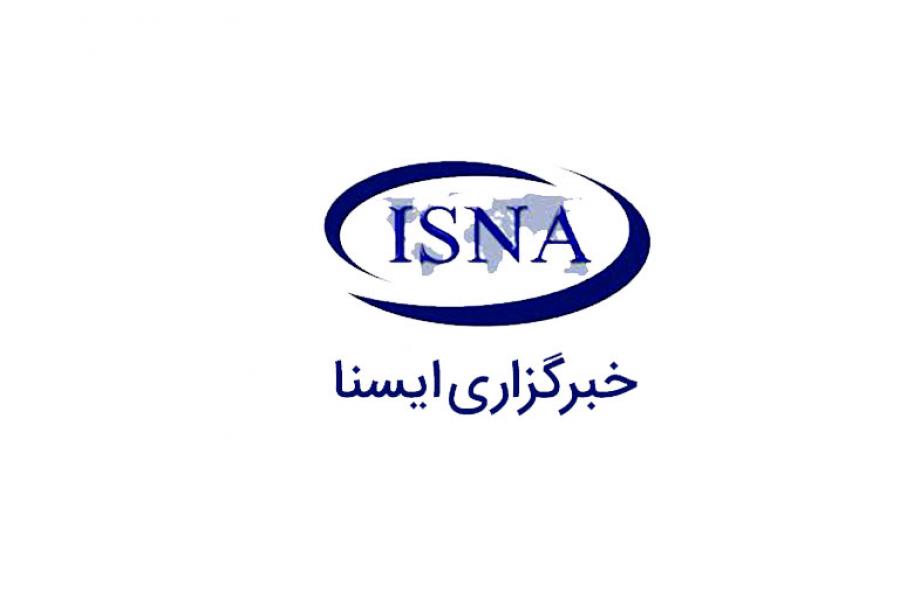
بررسی مقالهمحوری یا مسالهمحوری در یک نشست علمی
به گزارش ایسنا، یکصد و چهل و ششمین نشست علمی-تخصصی مرکز پژوهش‌های توسعه و آینده‌نگری با عنوان «نقش دانشگاه‌ها در نظام حکمرانی و توسعه کشور؛ دوگانه مقاله‌محوری یا مسأله‌محوری» برگزار می‌شود.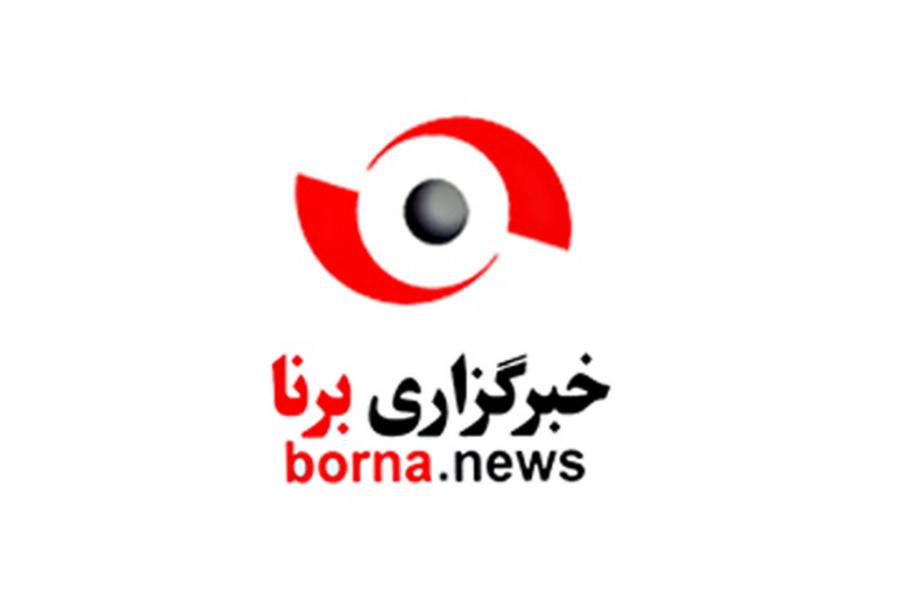
نشست بررسی پدیده مقاله محوری یا مسأله محوری در نظام دانشگاهی کشور برگزار میشود
به گزارش خبرگزاری برنا، یک‌صد و چهل و ششمین نشست علمی-تخصصی با عنوان" نقش دانشگاه‌ها در نظام حکمرانی و توسعه کشور؛ دوگانه مقاله محوری یا مسأله محوری "روز سه‌شنبه 30 آبان‌ماه 1402، از ساعت 9:00 الی 11:00، با حضــور جامعه علمی، پژوهشی، دانشگاهی، اندیشگاهـی، صاحب‌نظران، مدیـران، کارشناسان دستگاه‌های اجــرایی ملّی و استـانی برگزار می‌شود.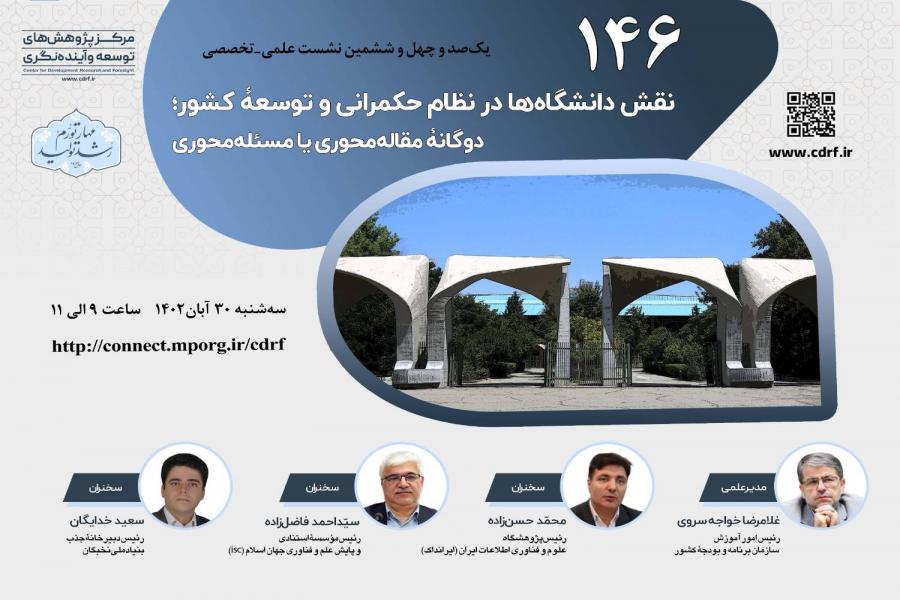
یکصدوچهل و ششمین نشست علمی تخصصی مرکز پژوهش های توسعه و آینده نگری منتشر شد
یکصدوچهل و ششمین نشست علمی تخصصی با عنوان "نقش دانشگاه‌ها در نظام حکمرانی و توسعه کشور؛ دوگانه مقاله محوری یا مسأله محوری"مرکز پژوهش های توسعه و آینده نگری منتشر شد.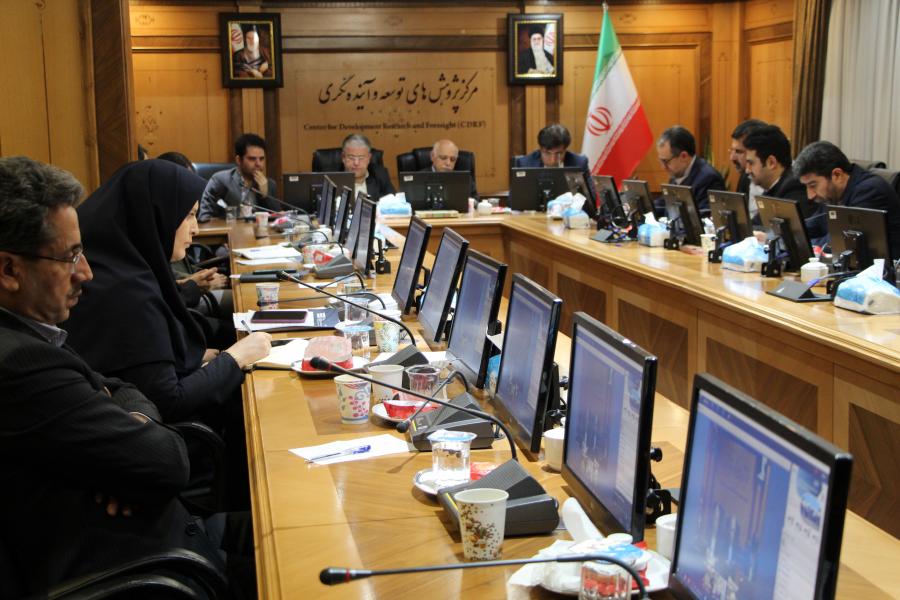
کشور برای توسعه همه‌جانبه به ظهور دانشگاه‌های نسل سوم نیاز دارد
در نشست علمی- تخصصی مطرح شد: دوگانه مسأله‌محوری و مقاله محوری آیا واقعیت دارد؟ در رتبه‌بندی آثار 20 کشور پیشرو علمی جهان در سال 2022 در پایگاه وب او ساینس ایران در رتبه هفدهم قرار دارد. همچنین بر اساس تولیدات علمی بین 20 کشور پیشرو جهان در سال 2022 در پایگاه اسکوپوس ایران در جایگاه پانزدهم قرار دارد. دانشگاه‌ها در سطح کشور باید به سمت دانشگاه‌های نسل سوم حرکت کنند.
An investigation into corruption indices
This report is a preliminary draft on the formulation of an administrative corruption index. It is written in response to the responsibilities assigned to the Center for Development and Foresight Research by the Coordinating Committee of Supervisory Bodies. The report aims to introduce some indices and indicators that can be used to measure corruption, and to illuminate different dimensions that govern the case of formulating a corruption index.
Evaluating the Taxable Potential of Rental Income from Residential Properties and Vacant Homes in 2022
The imposition of a tax on vacant residential units is believed to influence behavior and align the vacancy rate with its natural level. From this perspective, the total tax capacity of vacant residential units is estimated at 12 thousand billion tomans, with 40% attributed to Tehran province. Given the current state of the housing market, it is deemed necessary for the government to intervene through the implementation of a tax law targeting vacant housing units. This serves as a regulatory mechanism to manage the housing market, control speculation, and reduce the profitability of unproductive activities in the housing sector.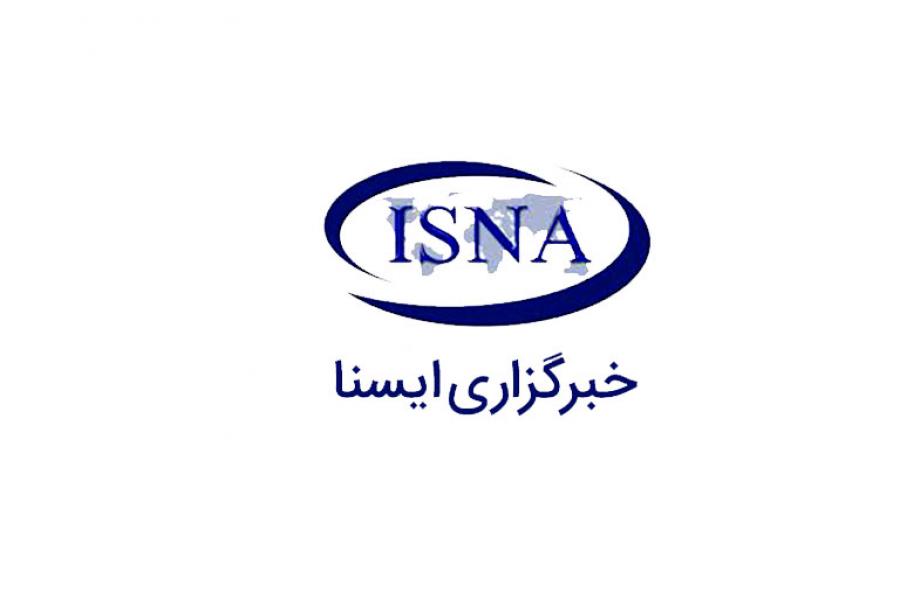
کمتر از یک درصد پایاننامهها کاربردی هستند/باید دست کسی را که مقاله ارزشمند مینویسد، بوسید
رئیس ایرانداک در مورد رصد میزان کاربردی بودن پایان‌نامه‌های ثبت‌شده در ایرانداک، توضیح داد: در زمان ثبت پایان‌نامه‌ها در ایرانداک این سؤال از افراد پرسیده می‌شود که این پایان‌نامه یا رساله تا چه میزان سفارش یک مجموعه بوده و یا کاربردی بوده است؟ متاسفانه تاکنون این میزان کمتر از یک درصد بوده است. این نشان می‌دهد که مدعی‌العموم و دانشگاه مساله را حل کرده، ولی صاحب مساله نسبت به آن واقف نیست و یا به دنبال حل صورت مساله بوده و یا مشکل خود را با یک کالای وارداتی حل کرده است.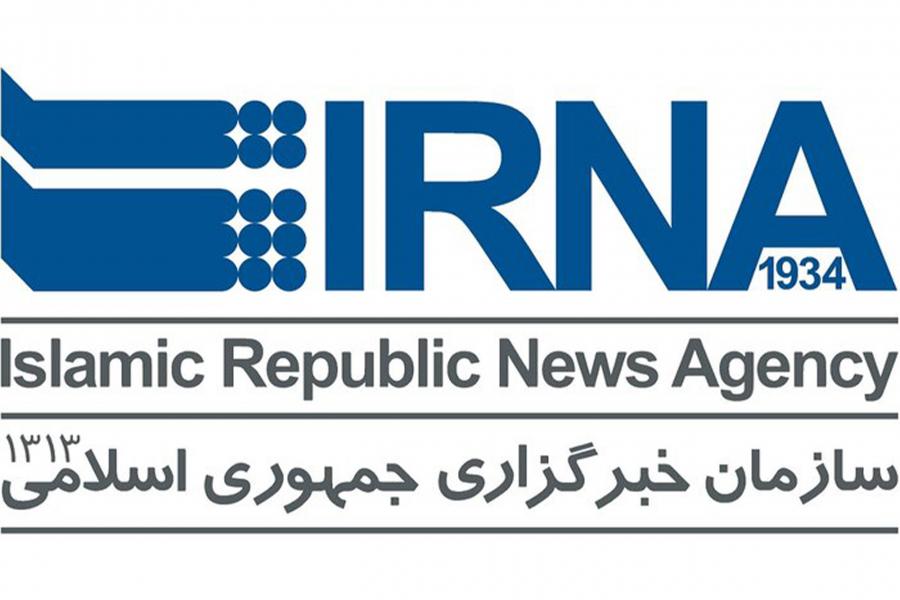
همترازی ایران با ترکیه و دارابودن جایگاه اول تولیدات علمی بین کشورهای اسلامی
تهران- ایرنا- وضعیت جایگاه علمی ایران در بین کشورهای اسلامی، همسایه و جهان و تاکید بر برتری ایران نسبت به کشورهای اسلامی در بازه زمانی ۱۰ سال (۲۰۲۳-۲۰۱۳) و همچنین رقابت و همترازی با کشور ترکیه از جمله مباحثی بود که در نشست علمی-تخصصی مرکز تحت عنوان «نقش دانشگاه‌ها در نظام حکمرانی و توسعه کشور؛ دوگانه مقاله محوری یا مسأله محوری» با حضور صاحبنظران بررسی شد.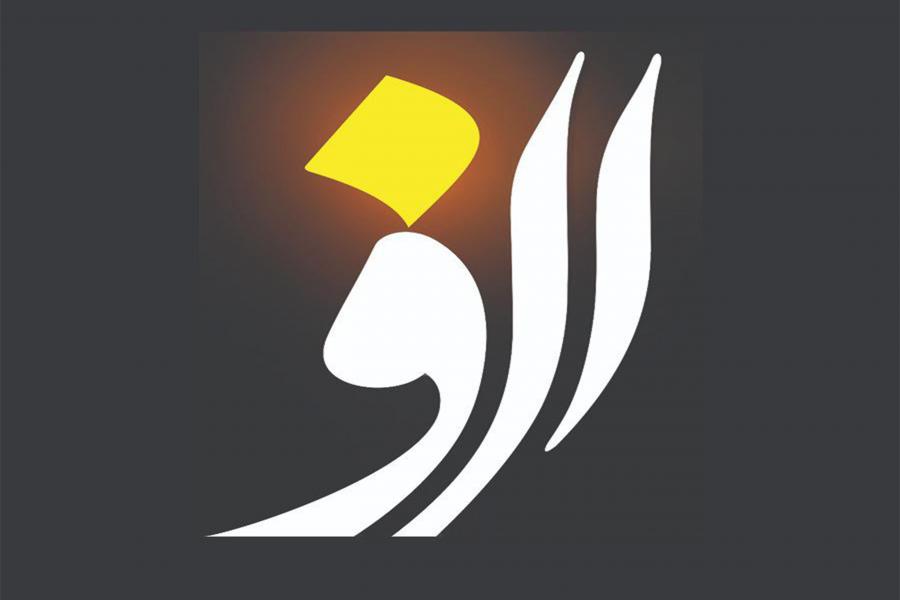
کشور برای توسعه همهجانبه به ظهور دانشگاههای نسل سوم نیاز دارد
در نشست علمی- تخصصی مطرح شد: دوگانه مسأله‌محوری و مقاله محوری آیا واقعیت دارد؟ در رتبه‌بندی آثار 20 کشور پیشرو علمی جهان در سال 2022 در پایگاه وب او ساینس ایران در رتبه هفدهم قرار دارد. همچنین بر اساس تولیدات علمی بین 20 کشور پیشرو جهان در سال 2022 در پایگاه اسکوپوس ایران در جایگاه پانزدهم قرار دارد. دانشگاه‌ها در سطح کشور باید به سمت دانشگاه‌های نسل سوم حرکت کنند. 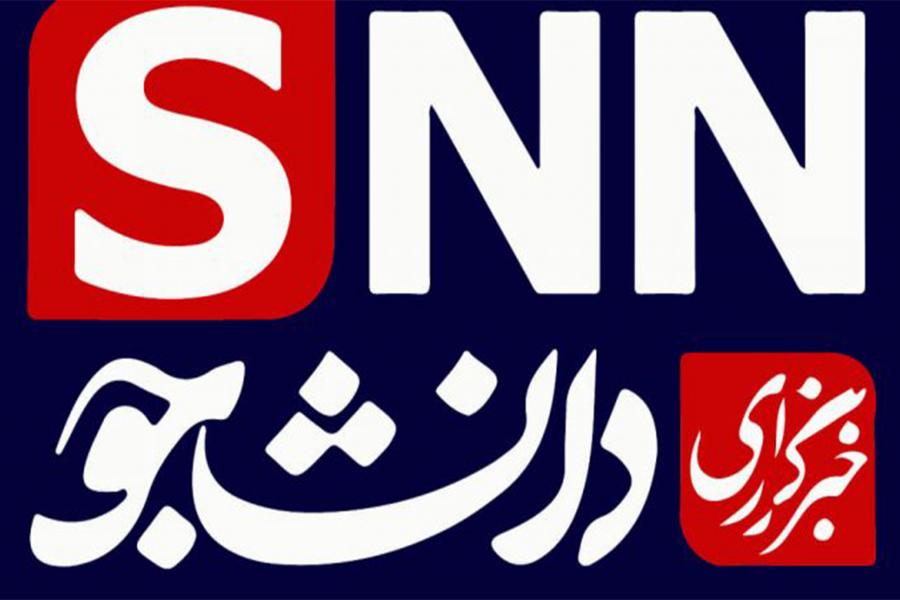
کشور برای توسعه همهجانبه به ظهور دانشگاههای نسل سوم نیاز دارد
بر اساس تولیدات علمی بین ۲۰ کشور پیشرو جهان در سال ۲۰۲۲ در پایگاه اسکوپوس ایران در جایگاه پانزدهم قرار دارد. دانشگاه‌ها در سطح کشور باید به سمت دانشگاه‌های نسل سوم حرکت کنند.
Examining the General Policies of Development Plans After the Islamic Republic of Iran’s Revolution
The systematic examination of the progression of policy content types within developmental plans indicates that policymakers in the field of development have consistently allocated half of their policy guidelines to public policies. This suggests an ongoing effort to address and resolve executive issues and problems within these developmental plans. Furthermore, the temporal increase in the proportion of guiding policies, coupled with a simultaneous decrease in comprehensive policies, demonstrates that when policymakers articulate values, they do so within the framework of policy guidelines or recommendations, alongside executive concepts. The findings reveal that the least favorable status in terms of content pertains to the policy guidelines of the second developmental plan, while the most favorable status is associated with the policy guidelines of the sixth plan.
Promoting Smart Growth: A Strategic Approach to Nurturing Innovation and Entrepreneurship in Iran
Economic growth is a fundamental driver of national prosperity, leading to improvements in per capita income, living standards, and national strength. Iran's development plans, such as the twenty-year vision and the sixth development plan, underscore the importance of achieving high and sustainable economic growth. To realize this goal, it is essential to carefully evaluate the factors influencing economic growth and formulate appropriate policies to address them.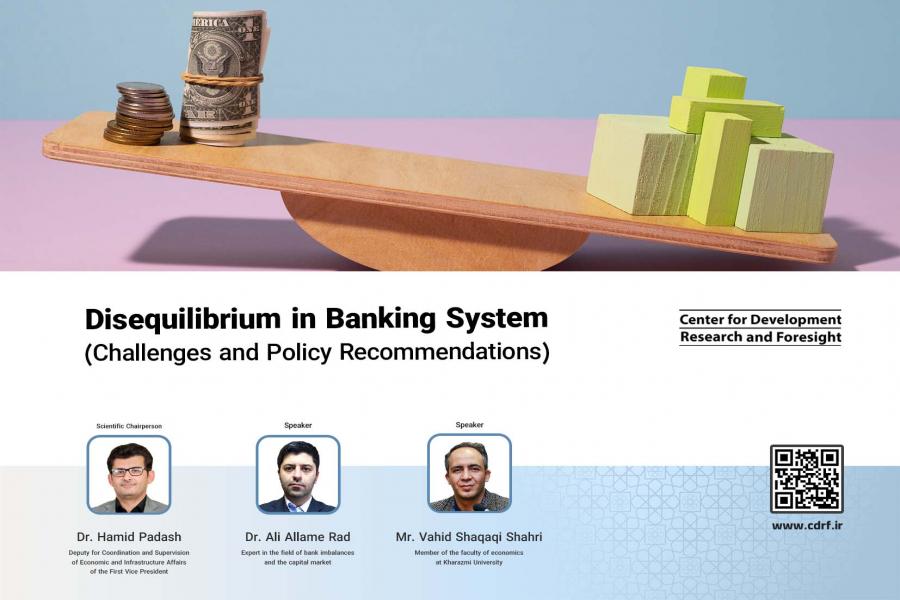
Disequilibrium in Banking System: Challenges and Policy Recommendations
The banking sector's disequilibrium has emerged as a pervasive and enduring challenge within the nation's macroeconomic framework. A series of strategic missteps have plagued the banking sector over the preceding four decades, including: the absence of unified Central Bank oversight from the late 1960s until 1994, despite formal recognition (substantive supervision remained deficient), the premature privatization of the banking industry without adequate national economic preparation, the imposition of government expenditures on private and non-governmental banks, particularly to offset a portion of the budget deficit, the perpetuation of a traditional view of money as a private commodity (a primary factor exacerbating domestic inflation), and vacillation between disparate economic schools, shifting from socialist to capitalist ideologies.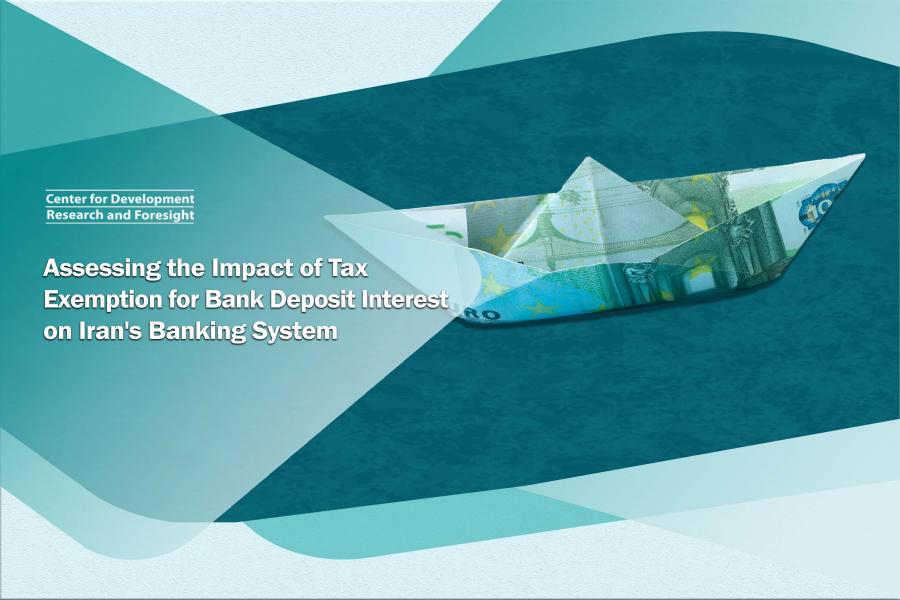
Assessing the Impact of Tax Exemption for Bank Deposit Interest on Iran's Banking System
The exemption of bank deposit interest from taxation within Iran’s financial system is a topic of considerable debate in this field. This research investigates whether the tax on deposit interest should be regarded as an integral component of the tax system or if it should continue to be exempt. Addressing this question, which forms the crux of this study, necessitates a comprehensive review of tax literature, the structure of Iran’s tax system, and its economic, social, and political conditions. This research adopts a three-step approach to address the issue of exempting bank deposit interest from taxation.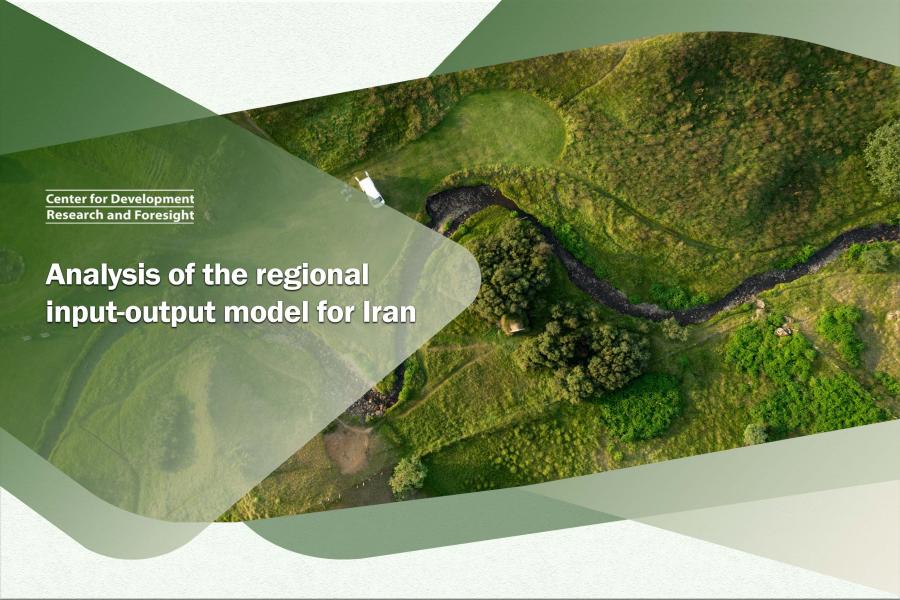
Analysis of the regional input-output model for Iran
In the contemporary global landscape, the evolution of planning systems has instigated a widespread transition towards decentralization and regional planning, predicated on the unique capabilities and advantages inherent to each region. This necessitates the execution of regional analyses employing a diverse array of methodologies. The input-output model has emerged as a prevalent method in regional planning. As one of the most sophisticated techniques in economic accounting, the regional input-output model elucidates the pattern of interaction among economic activities within or across various regions.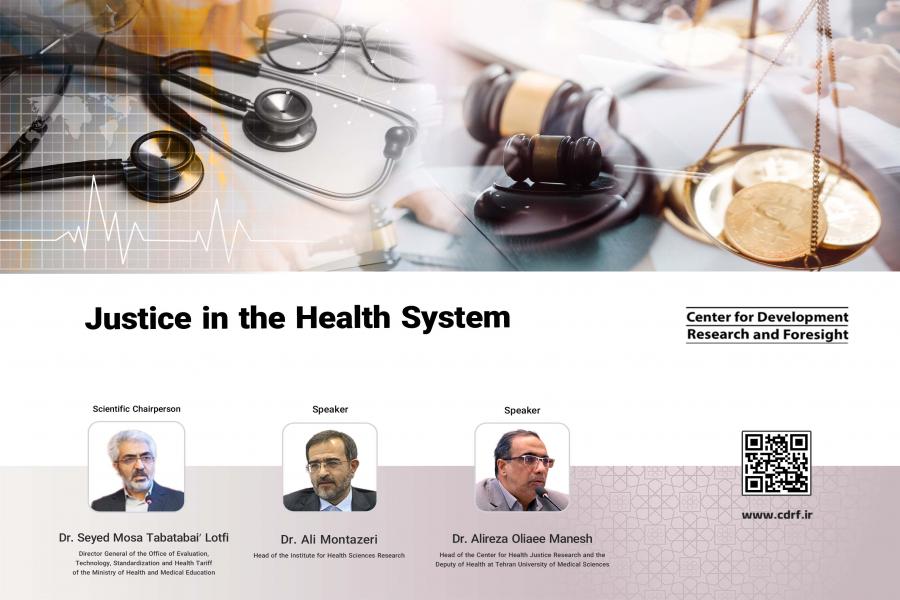
Justice in the Healthcare System
In the realm of healthcare, justice signifies equal access to healthcare services for all individuals. Key indicators for evaluating justice in health include justice in distribution, payment, access, and financial provision. Health equality entails implementing policies and allocating resources in a manner that individuals with fewer resources and those facing deprivation and discrimination (due to factors such as race, gender, age, disability, or income) experience significant improvements in their health and quality of life.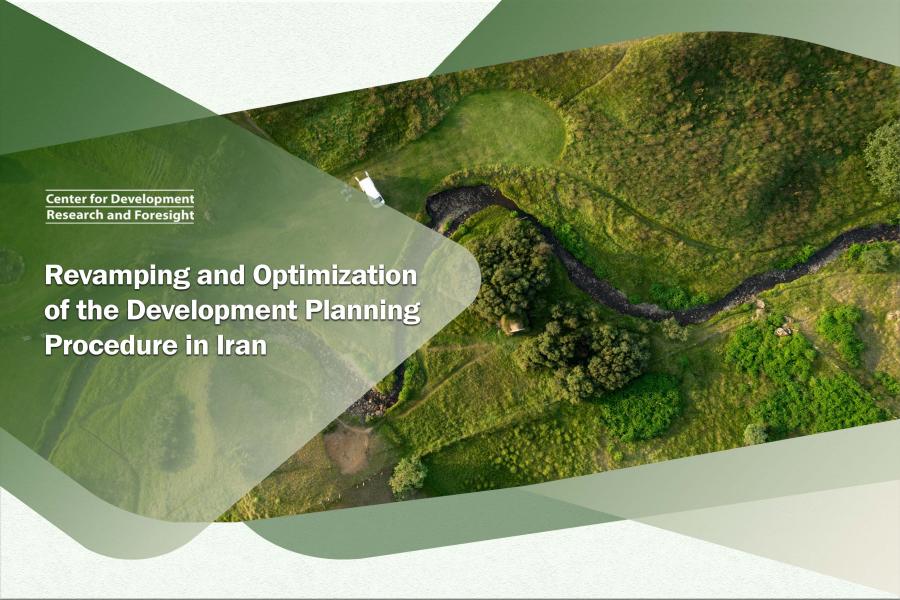
Revamping and Optimization of the Development Planning Procedure in Iran
An evaluation of Iran’s development programs across various periods reveals that most have not achieved the desired outcomes, with some exhibiting a significant performance gap relative to their stated goals. In certain instances, the substantial discrepancy between performance and objectives underscores the failure of planning within the country. Consequently, the shortcomings of planning in Iran have piqued the interest of numerous scholars and academics. The findings of these studies suggest that some plan failures can be attributed to structural deficiencies in the country’s planning system, while others are related to the political and economic issues that govern the formulation and implementation of the plan. In response to these shortcomings, proposals have been put forth to enhance programs within the country. These enhancements include utilizing key cores, rolling planning, or eliminating medium-term plans and focusing on aligning one-year plans with long-term plans.
Maritime Development is a Key to Boast Economic Growth
The recent conference at the Center for Development Research and Foresight highlighted the growing importance of the maritime economy to the country's future. Experts and officials convened to discuss the potential of the seas and coasts to drive growth, create jobs, and address some of the country's long-term challenges.
The Role of Universities in the Governance and Development of the Country; The Duality of Research-Centric or Problem-Centric
The conference at the Center for Development and Foresight Research titled “The Role of Universities in the Governance and Development of the Country; The Duality of Research-Centric or Problem-Centric” addressed the role of universities in the governance and development of a country. It is stated that universities have four main responsibilities: educating and training specialized human resources, advancing the frontiers of knowledge, providing services to society, and promoting societal culture.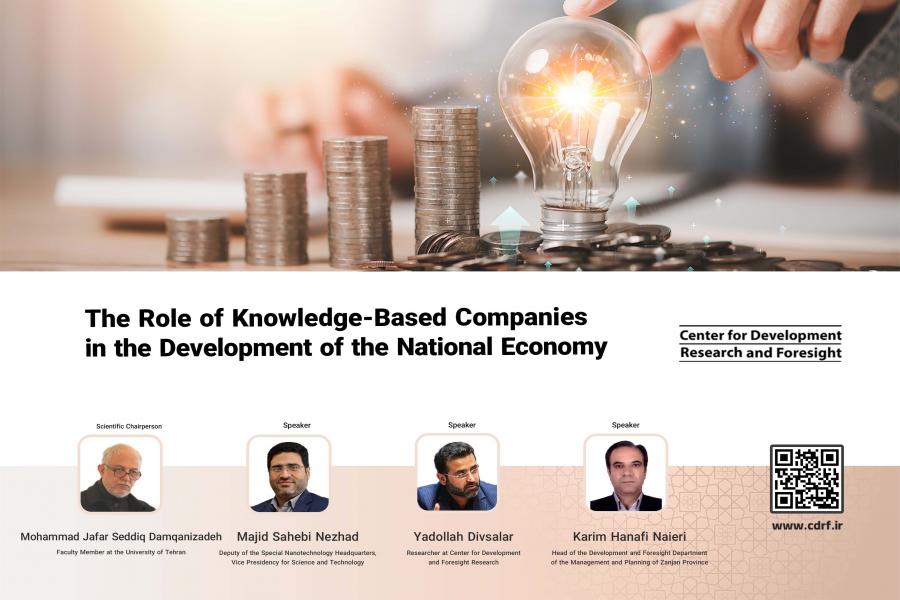
The Role of Knowledge-Based Companies in the Development of the National Economy
The conference titled “The Role of Knowledge-Based Companies in the Development of the National Economy” was held at the Center for Development Research and Foresight to discuss the role of knowledge-based companies in the country's development. The speakers at the conference emphasized the importance of knowledge-based companies for Iran's economic future, due to factors such as sanctions, the country's economic structure, and its geographical location.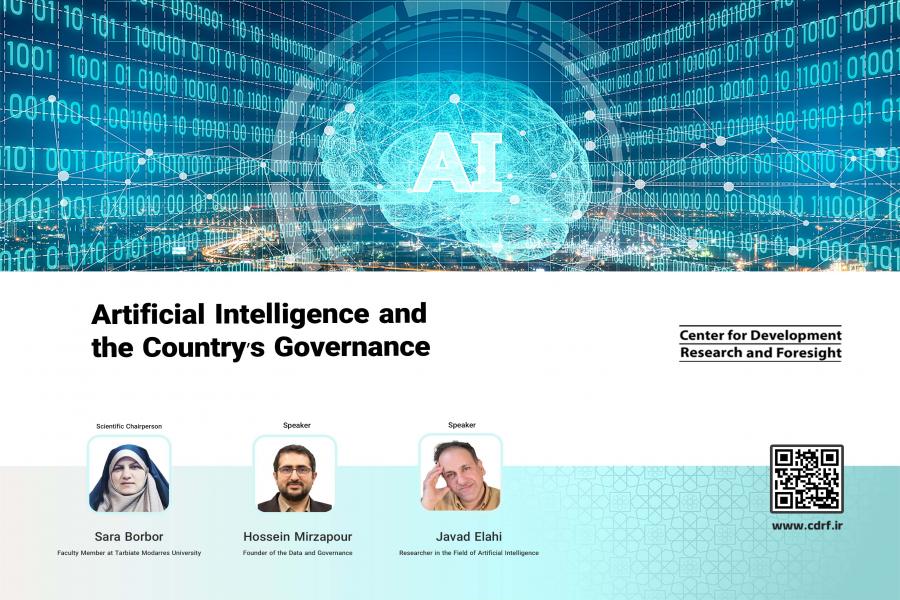
The Artificial Intelligence and the Country's Governance
The country's leading minds in artificial intelligence (AI) convened in specialized conference titled “The Artificial Intelligence and the Country's Governance” at the Center for Development Research and Foresight, Iran, tackling crucial questions about governing this powerful technology and harnessing its potential for good.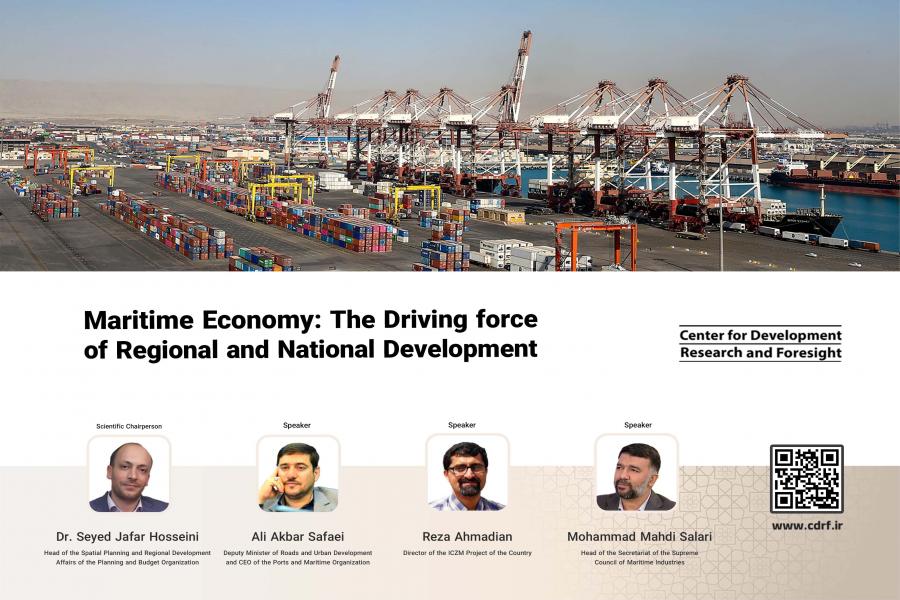
Maritime Development is a Key to Boast Economic Growth
The recent conference at the Center for Development Research and Foresight highlighted the growing importance of the maritime economy to the country's future. Experts and officials convened to discuss the potential of the seas and coasts to drive growth, create jobs, and address some of the country's long-term challenges.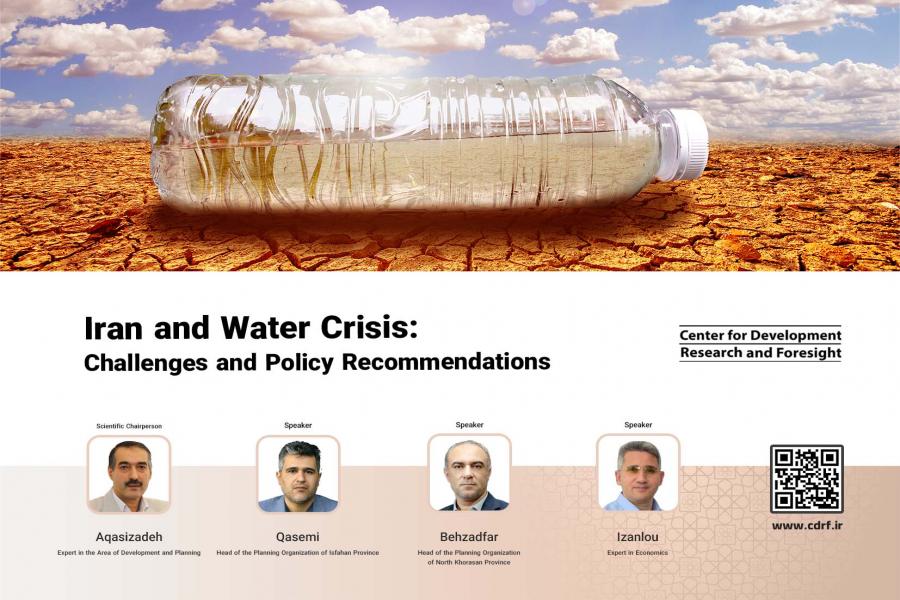
Iran's Water Crisis: A Looming Threat, Experts Warn
Iran's water crisis, long simmering beneath the surface, has reached a boiling point, according to experts who gathered at a conference titled “Iran's Water Crisis: A Looming Threat, Experts Warn” at the Center for Development Research and Foresight. The conference brought together leading figures in planning, development, economics, and water resource management to discuss the challenges and potential solutions to this pressing issue.
The Importance of Data Mining in Financial Transparency
The recent conference at the Center for Development Research and Foresight brought together experts to discuss how data governance and mining can improve the country's budgeting process. The conference was part of an ongoing series aimed at improving budget transparency and efficiency.
Parliamentary Intervention in Budgeting: A Scrutiny-Seeking Issue
The Conference titled “Parliamentary Intervention in Budgeting: A Scrutiny-Seeking Issue” with a concentration on improving the budgeting process in Iran, held at the Center for Development Research and Foresight, brought together experts to discuss the role of parliament in budget decision-making. The conference highlighted the ongoing debate about the extent to which parliament should be involved in the budgeting process, with some arguing for more oversight and others emphasizing the need for executive flexibility.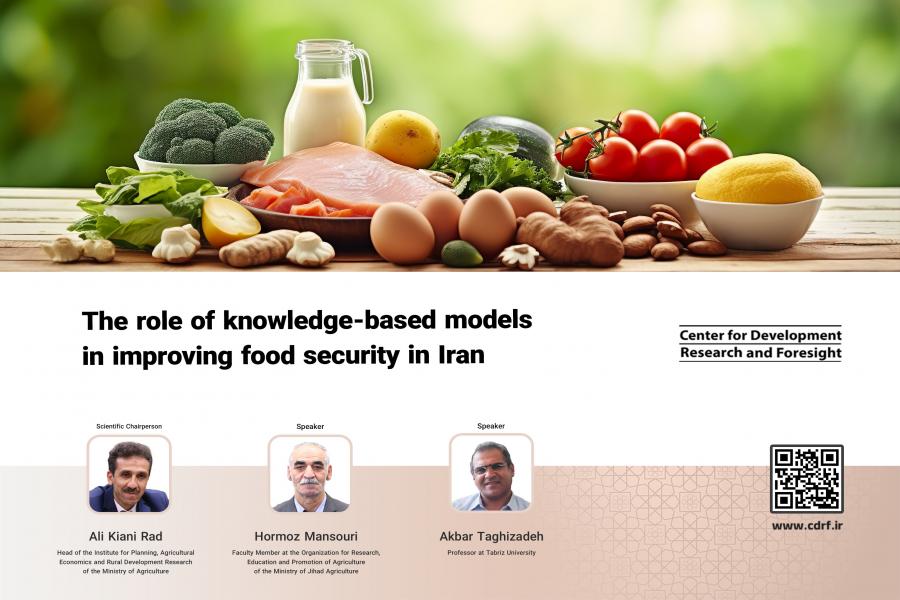
The Role of Knowledge-Based Models in Improving Food Security in Iran
The conference titled “The Role of Knowledge-Based Models in Improving Food Security in Iran” at the Center for Development Research and Foresight brought together experts to discuss the critical issue of food security in the country. The conference highlighted the challenges facing Iran's agricultural sector and explored potential solutions.
Shedding light on the Minimum Wage Policy in Iran
The recent conference titled “Shedding light on the Minimum Wage Policy in Iran” at the Center for Development Research and Foresight brought together economists and policymakers to discuss the country's wage policies. Hojjatollah Mirzaei, a faculty member at Allameh Tabataba'i University, criticized the recent wage hikes as inadequate and unevenly implemented. He argued that they failed to keep pace with inflation, leaving workers worse off, and called for the government to be more transparent about the basis for the increases. Mirzaei also expressed concern about the lack of consistency across different sectors, noting that some firms struggle to comply with the mandated increases. He emphasized the need for a more nuanced approach that considers the specific challenges of different industries.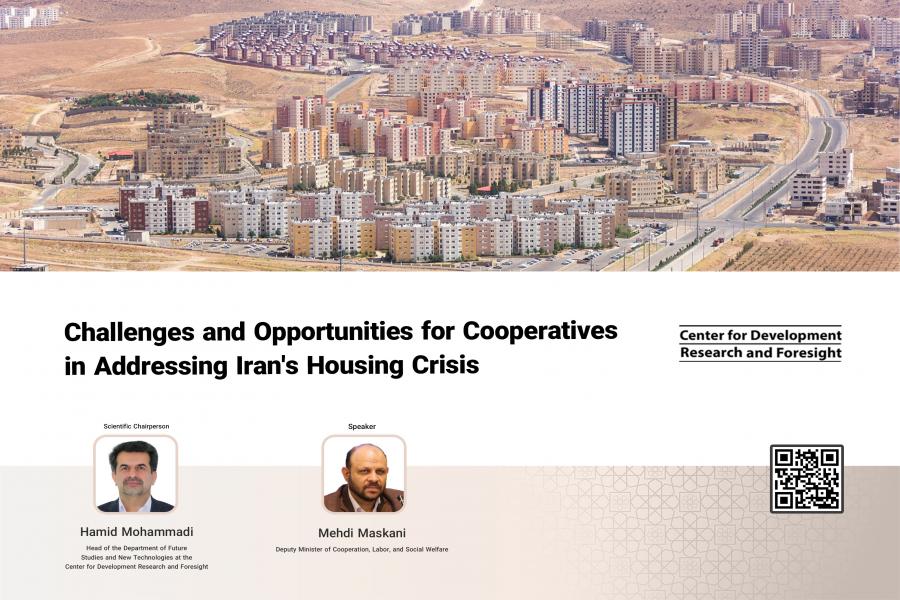
Challenges and Opportunities for Cooperatives in Addressing Iran's Housing Crisis
The recent conference of “Challenges and Opportunities for Cooperatives in Addressing Iran's Housing Crisis” at the Center for Development Research and Foresight brought together experts from various fields to address the critical issue of housing affordability in Iran. The conference highlighted the challenges faced by the Iranian housing market and explored potential solutions, particularly through the lens of cooperative housing models.
Unlocking Potential: Reforming Iran's Free Zones
The conference titled “Unlocking Potential: Reforming Iran's Free Zones” was held at the Center for Development Research and Foresight to discuss the performance of free zones in Iran. The conference was attended by stakeholders from the public and private sectors, including government officials, academics, and businesspeople.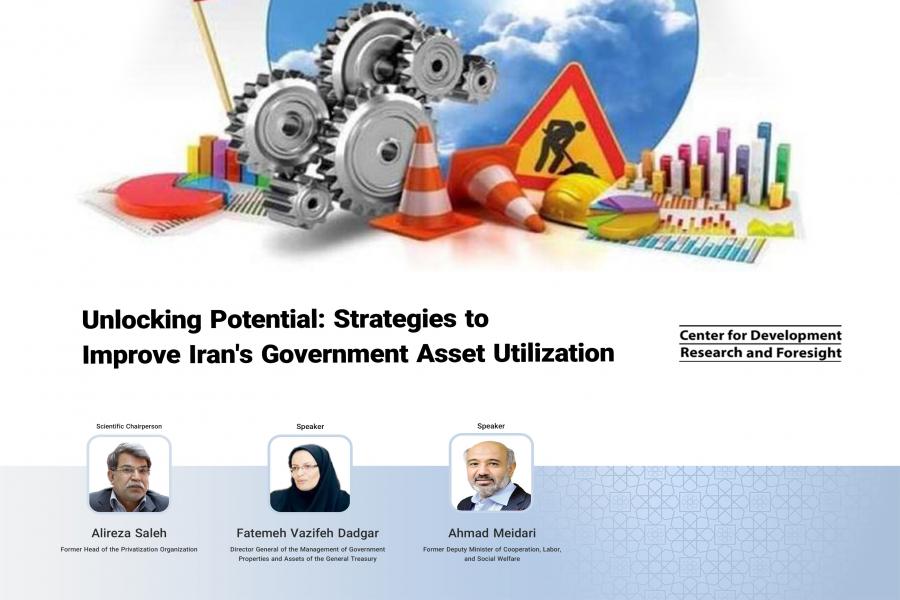
Unlocking Potential: Strategies to Improve Iran's Government Asset Utilization
In the conference titled “Unlocking Potential: Strategies to Improve Iran's Government Asset Utilization” at the Center for Development Research and Foresight aimed at addressing the challenges of managing government assets, Iranian officials discussed issues ranging from inefficient asset allocation to the need for legal reforms. The conference brought together experts from various sectors to explore strategies for maximizing the value of government-owned properties and resources.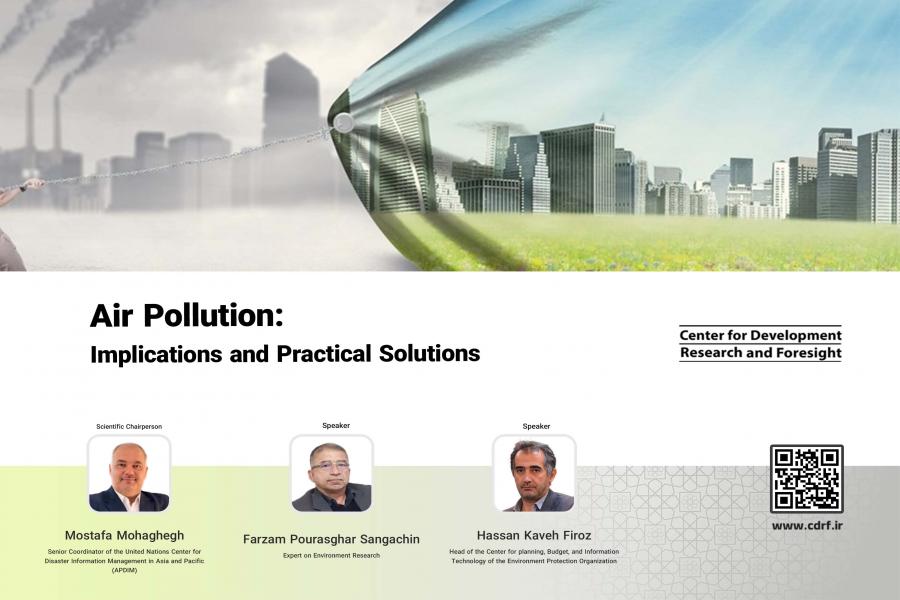
Air Pollution: Challenges and Operational Solutions
Air pollution is a major threat facing the world today, with millions of deaths attributed to it each year, according to experts who convened at the scientific-specialized conference titled "Air Pollution: Challenges and Operational Solutions" at the Center for Development Research and Foresight.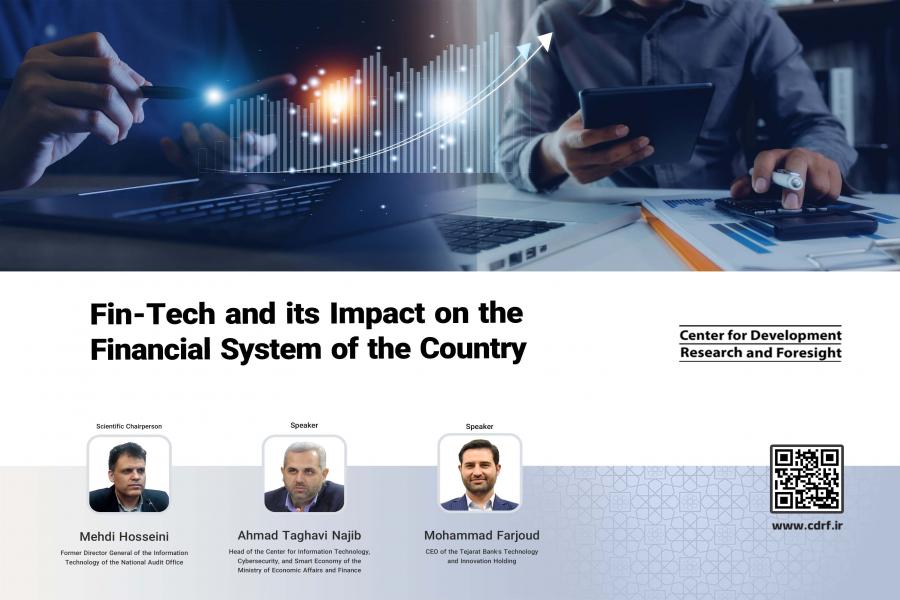
The Role of Financial Technologies in the Country’s Economic System: Challenges and Policy Recommendations
The scientific-specialized conference, titled "The Role of Financial Technologies in the Country's Economic System: Challenges and Policy Recommendations" at the Center for Development Research and Foresight brought together experts from various fields to discuss the potential and pitfalls of FinTech in Iran's developing economy.
Extraterrestrial Cultivation: Water and Food Security
In a move that could revolutionize its agricultural sector, Iran is setting its sights on extraterrestrial cultivation, aiming to tap into the water and soil resources of other countries to improve food security and expand its agricultural exports. This ambitious plan was discussed at the conference titled “Extraterrestrial Cultivation: Water and Food Security” at the Center for Development Research and Foresight.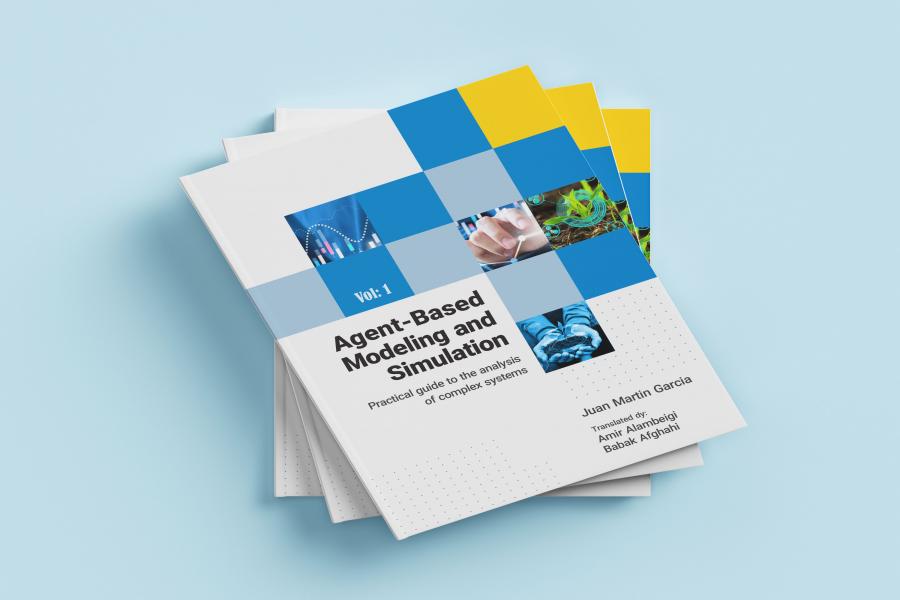
Agent-Based Modeling and Simulation: A Practical Guide for Analyzing Complex Systems
The Center for Development Research and Foresight has published a new book titled "Agent-Based Modeling and Simulation: A Practical Guide for Analyzing Complex Systems," authored by Professor Juan Martin Garcia and translated by Dr. Amir Alambigi and Dr. Babak Afqahi.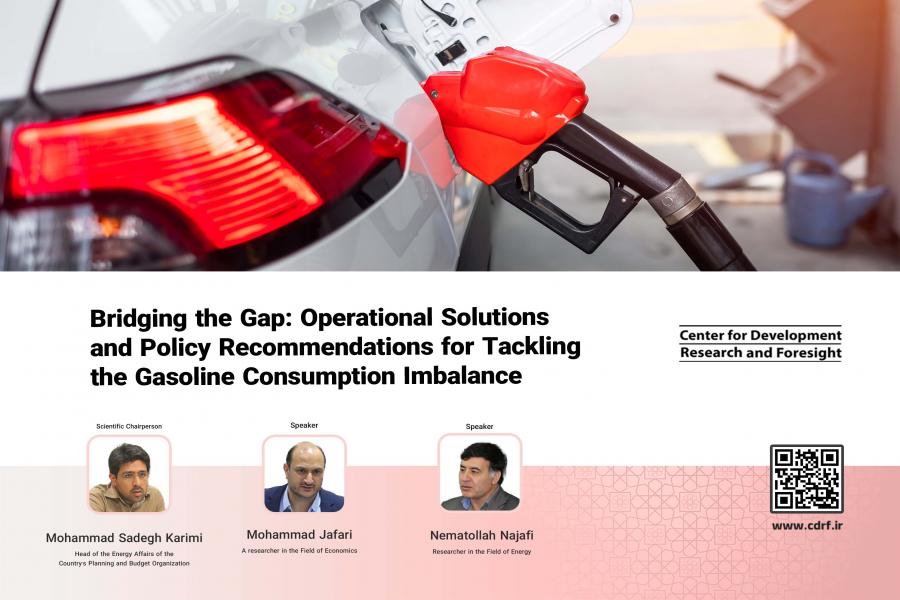
Bridging the Gap: Operational Solutions and Policy Recommendations for Tackling the Gasoline Consumption Imbalance
Iran is facing a growing problem at the pump. The country is burning through gasoline at an alarming rate, and experts are calling for action. In the recent conference titled “Bridging the Gap: Operational Solutions and Policy Recommendations for Tackling the Gasoline Consumption Imbalance” at the Center for Development Research and Foresight, key figures from government and academia discussed a range of solutions to bridge the gap between Iran's fuel consumption and supply..jpg)
SMEs and Strategies to Overcome Barriers: The Role of Strategically-Aligned and Geographically-Proximate Countries
An international meeting held on April 24, 2024, at the Center for Development Research and Foresight, brought together experts to discuss the importance of small and medium-sized enterprises (SMEs) for economic growth and job creation, with a particular focus on the role of strategically-aligned and geographically-proximate countries. The meeting, titled "SMEs and Strategies to Overcome Barriers: The Role of Strategically-Aligned and Geographically-Proximate Countries," was led by Aidin Salamzadeh, the vice dean of the faculty of business management at the University of Tehran, who welcomed professor Galina Shirokova, the director of the Center for Strategic Entrepreneurship at HSE University of Saint Petersburg, Morteza Mohammadi Zanjireh, a faculty member at Imam Khomeini International University, and 17 university professors from St Petersburg University, Moscow State University, University of Calgary, and University of Notre Dame. 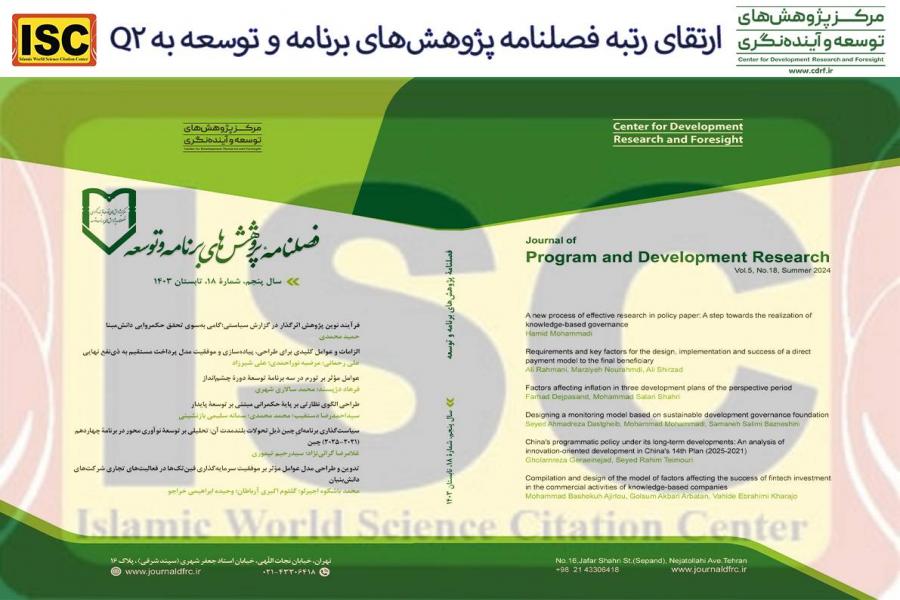
ارتقای رتبه فصلنامه پژوهشهای برنامه و توسعه به Q2
فصلنامه علمی پژوهش‌های برنامه و توسعه متعلق به مرکز پژوهش‌های توسعه و آینده‌نگری، موفق به ارتقاء و کسب رتبه Q2 در ارزیابی مؤسسه استنادی و پایش علم و فناوری جهان اسلام ISC شد.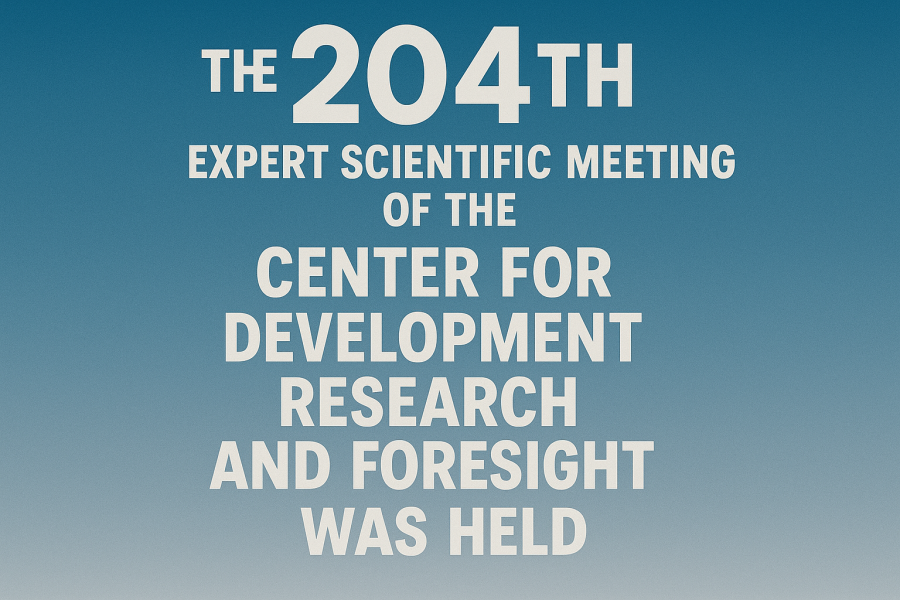
The 204th Expert Scientific Meeting of the Center for Development Research and Foresight (CDRF) was held.
According to the Public Relations Office of the CDRF, the 204th Expert Scientific Meeting of the CDRF was held on Tuesday, April 15, 2025, under the title 'The Government's Orientation in Fulfilling the 1404 Slogan (Investment for Production).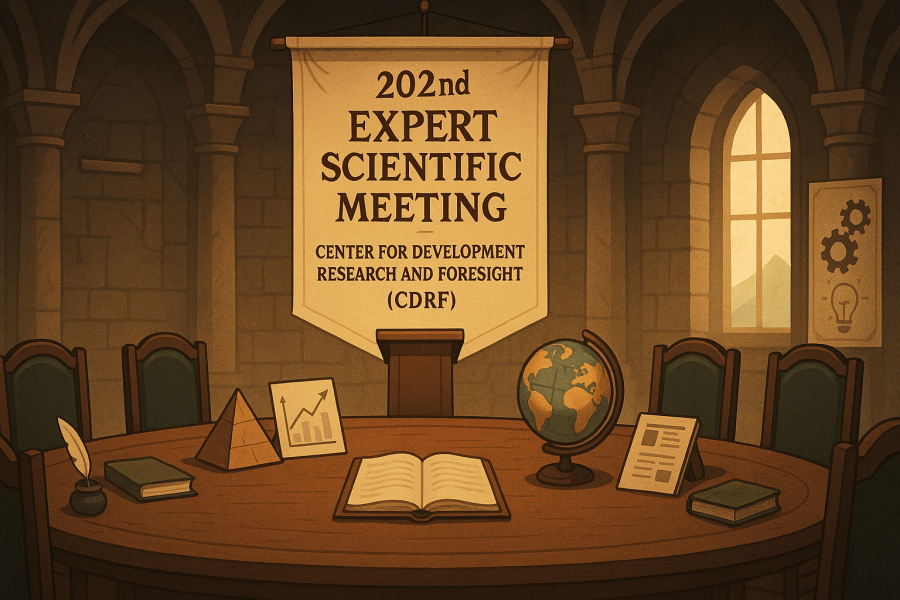
The 202nd Expert Scientific Meeting of the Center for Development Research and Foresight (CDRF) was held.
According to the Public Relations Office of the CDRF, the fifth international meeting and the 202nd expert scientific meeting of the CDRF was held under the title “The Impacts of Land Degradation and Climate Change on Iran's Economic and Social Development.” In this meeting, Mostafa Mohaghegh, Senior Coordinator of the United Nations Asian and Pacific Center for the Development of Disaster Information Management (APDIM), served as the scientific chair of the meeting. In addition, Farzam Pourasghar Sangachin, a researcher and expert in the field of environment, and Sanjay Kumar Srivastava, Chief of Disaster Risk Reduction at the United Nations Economic and Social Commission for Asia and the Pacific (ESCAP), participated as keynote speakers, presenting their viewpoints.
The 201st Expert Scientific Meeting of the Center for Development Research and Foresight (CDRF) was held.
According to the Public Relations Office of the CDRF, the eleventh session of the series entitled “The Future Outlook of Iran” and the 201st meeting of the CDRF was held under the title “A Critical Assessment of the Vision of the Islamic Republic of Iran in the Horizon of 1404 AH.”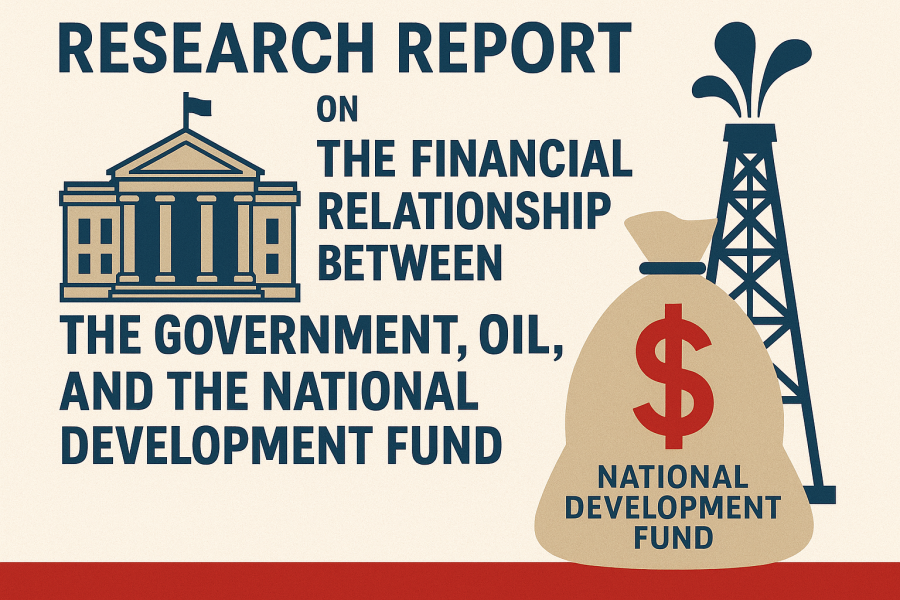
Research report on The Financial Relationship between the Government, Oil, and the National Development Fund
According to the Public Relations Office of the Center for Development and Foresight Research, the Research Group on Modern Systems of Planning, Budgeting, and Modeling has published a research report titled "The Financial Relationship between the Government, Oil, and the National Development Fund." This report is the outcome of expert discussions held within the specialized working group on Macroeconomics and Sustainable Development, as part of the series of events for the First National Conference on Improving the Budgeting Process in Iran..png)
The 198th Expert Scientific Meeting of the Center for Development Research and Foresight (CDRF) was held.
According to the Public Relations Office of the CDRF, the eighth session of the “Future Vision of the Islamic Republic of Iran” series and the 198th meeting of the CDRF was held under the title “Oil in Iran’s Vision.” In this meeting, Ali Agha-Mohammadi, Head of the Economic Group of the Office of the Supreme Leader and non-ex officio member of the Expediency Discernment Council of the System, served as the scientific chair of the meeting. Additionally, Asghar Ebrahimi Asl, former Deputy Minister of Oil during the ninth, tenth, and eleventh administrations, and Mohammad Reza Akbari, faculty member at the Petroleum Faculty of Amirkabir University of Technology and Head of the Governance Working Group for General Energy Policies of the Expediency Discernment Council of the System, participated as keynote speakers, presenting their viewpoints.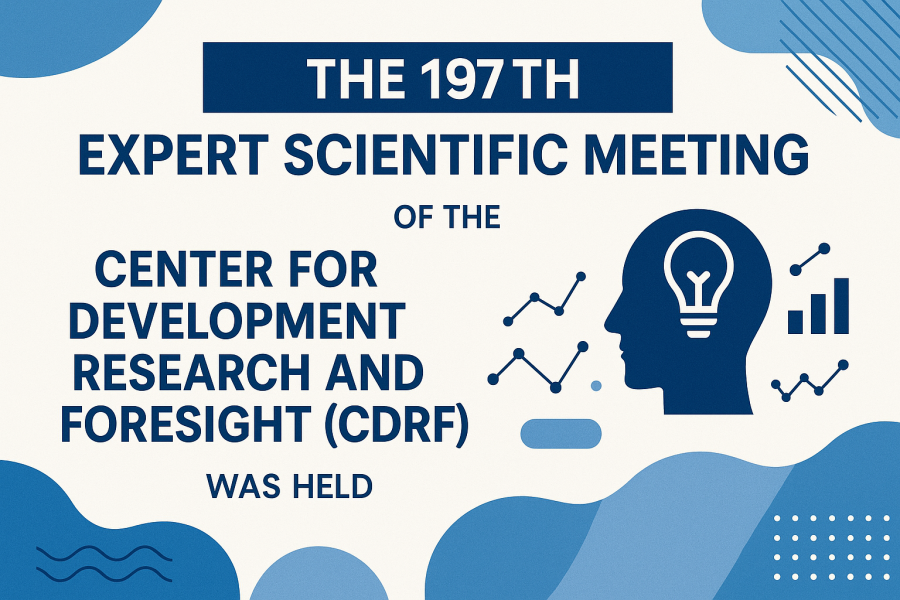
The 197th Expert Scientific Meeting of the Center for Development Research and Foresight (CDRF) was held.
According to the Public Relations Office of the CDRF, the seventh session in the series of meetings titled “The Future Vision of the Islamic Republic of Iran” and the 197th meeting of the CDRF was held under the title “The Role of Technology Development in Iran's Civil Vision.”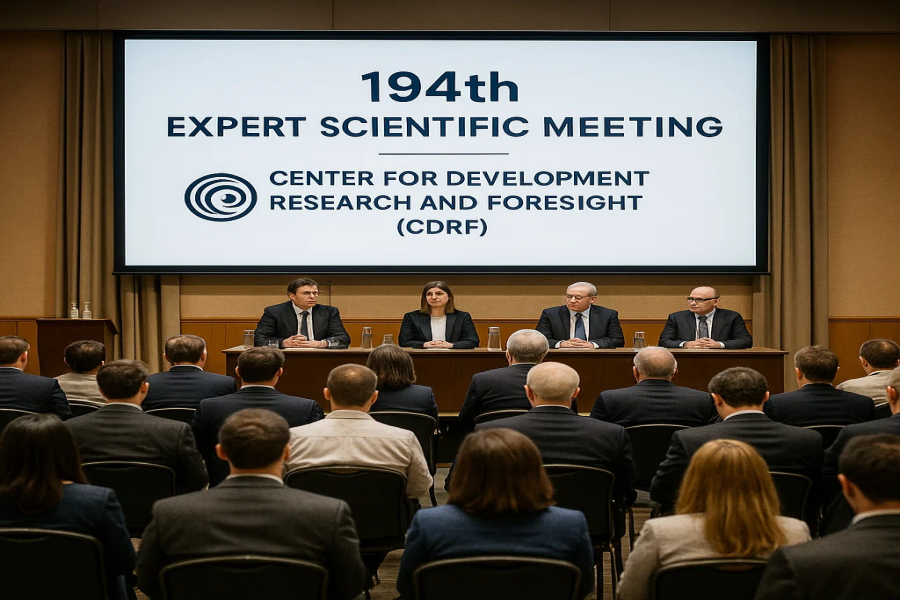
The 194th Expert Scientific Meeting of the Center for Development Research and Foresight (CDRF) was held.
According to the Public Relations Office of the CDRF, the fifth session of the “Future Vision of the Islamic Republic of Iran” series and the 194th expert scientific meeting of the CDRF was held under the title “The Vision of Demographic Changes and Urban Society.”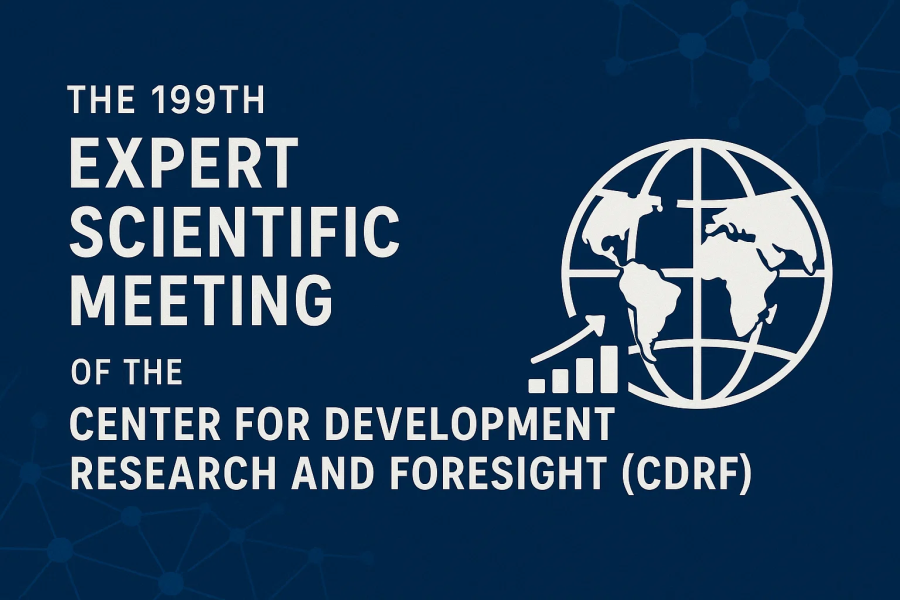
The 199th Expert Scientific Meeting of the Center for Development Research and Foresight (CDRF) was held.
According to the Public Relations Office of the CDRF, the ninth session of the series entitled “The Future Outlook of Iran” and the 199th expert scientific meeting of the CDRF was held under the title “Agriculture in the Vision of the Islamic Republic of Iran.”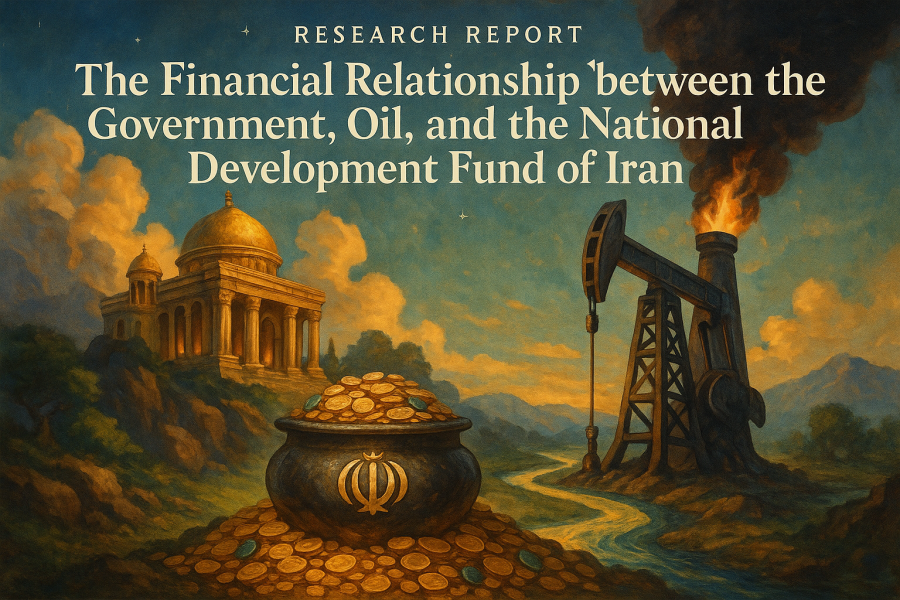
The research report titled “The Financial Relationship between the Government, Oil, and the National Development Fund of Iran” was published.
According to the Public Relations Office of the Center for Development Research and Foresight (CDRF), the Research Group on Modern Planning, Budgeting, and Modeling Systems has published a research report entitled “The Financial Relationship between the Government, Oil, and the National Development Fund of Iran.” This report is the outcome of expert discussions held within the Expert Working Group on Macroeconomics and Sustainable Development, conducted as part of the series of events of the First National Conference on Improving the Budgeting Process in Iran. The executive summary of this research report states: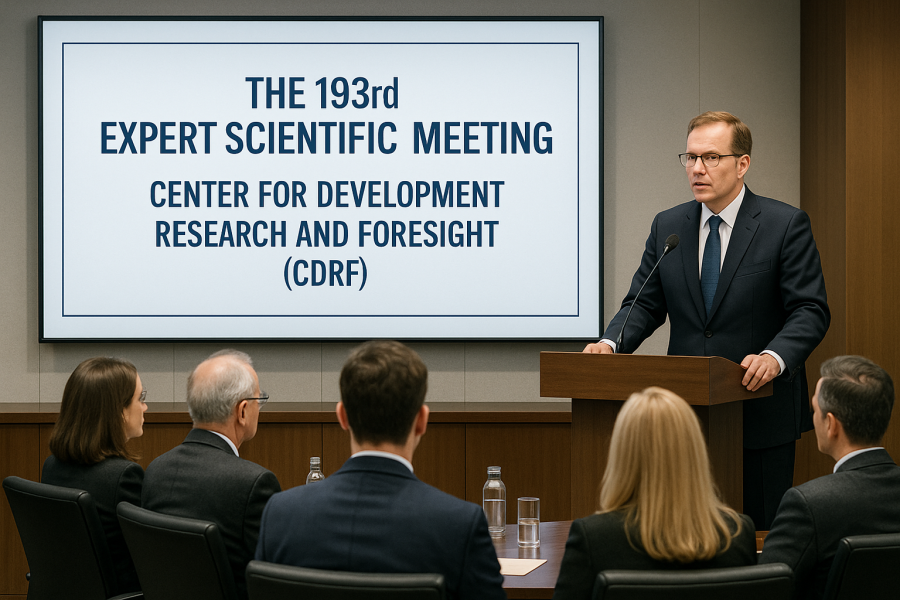
The 193rd Expert Scientific Meeting of the Center for Development Research and Foresight (CDRF) was held.
According to the Public Relations Office of the CDRF, the fourth session of the “Future Vision of the Islamic Republic of Iran” series and the 193rd expert scientific meeting of the CDRF was held under the title “Foresight Methodologies for Formulating the National Vision of the Islamic Republic of Iran”.